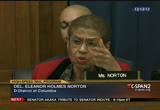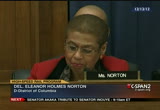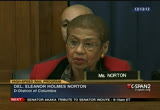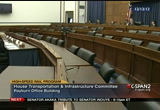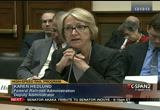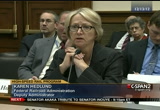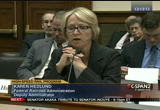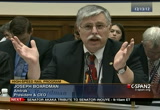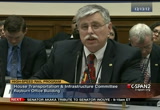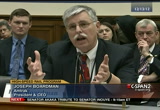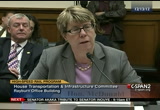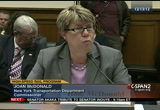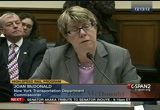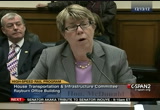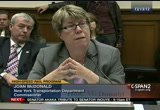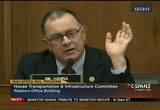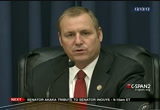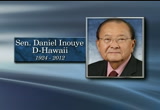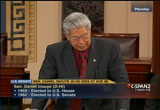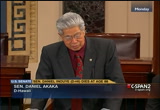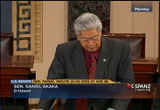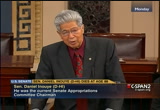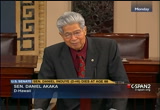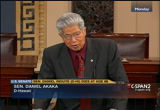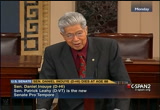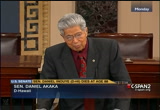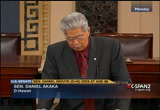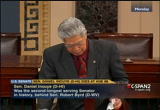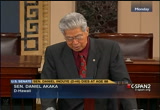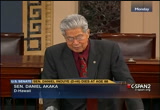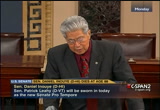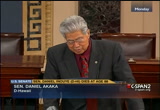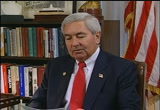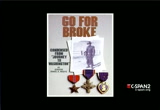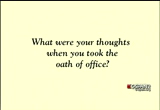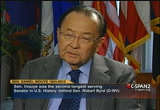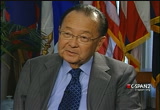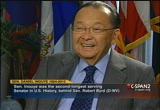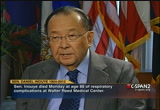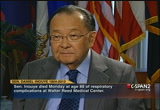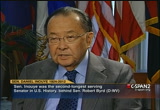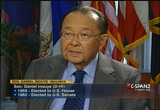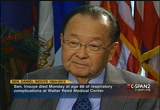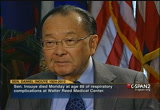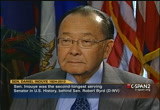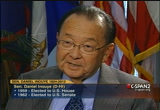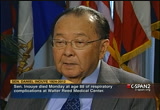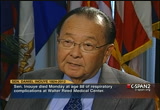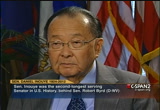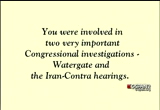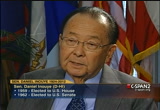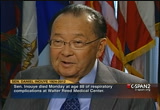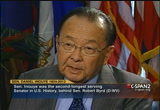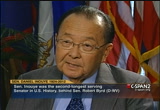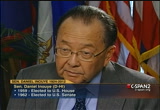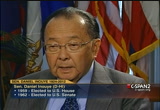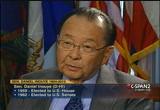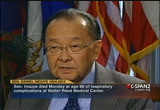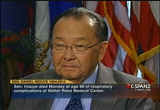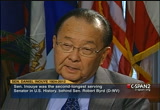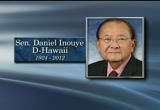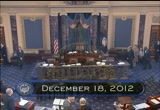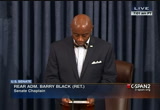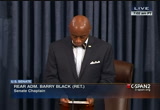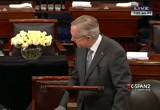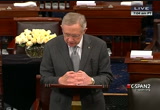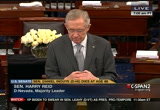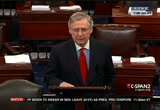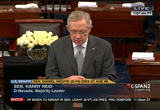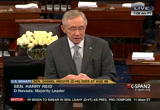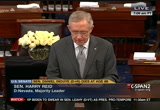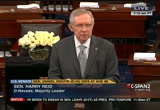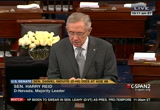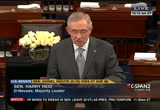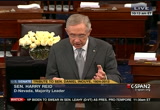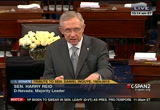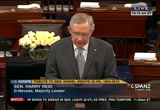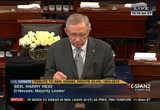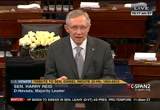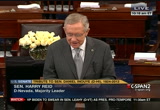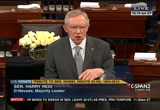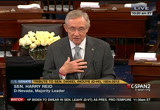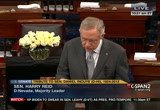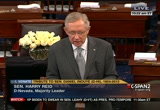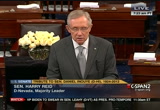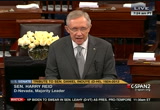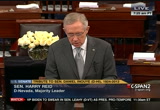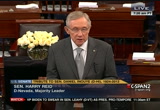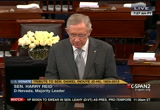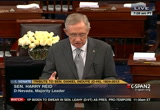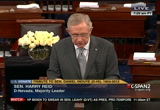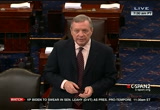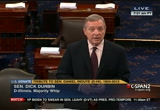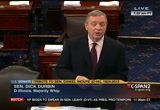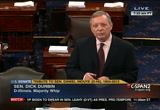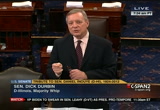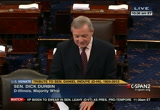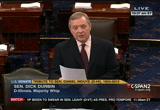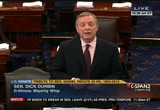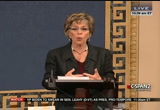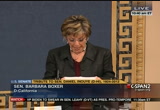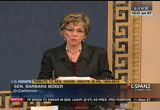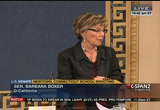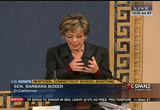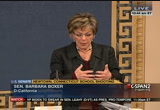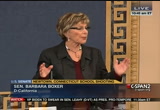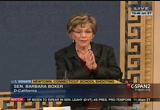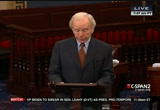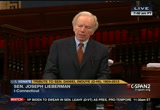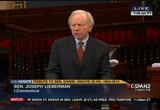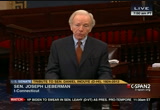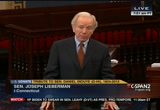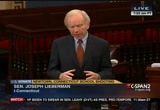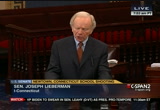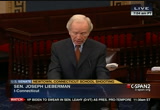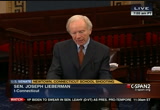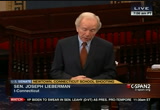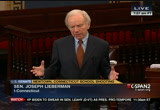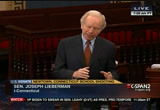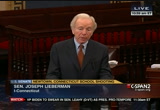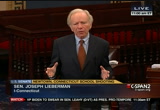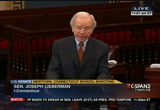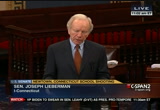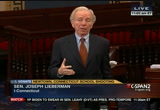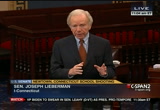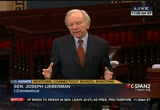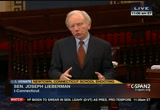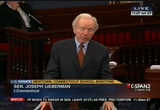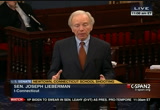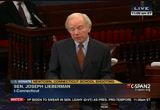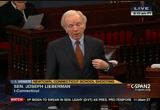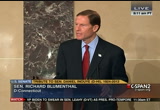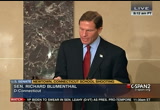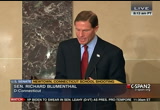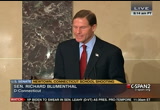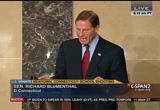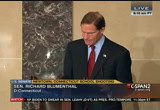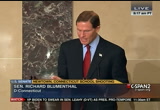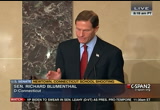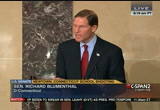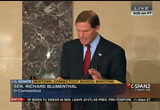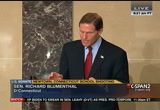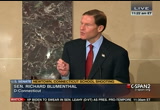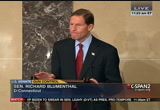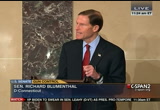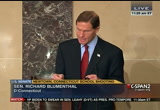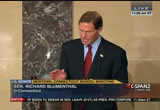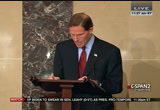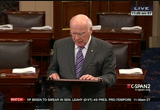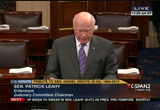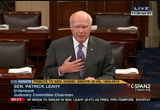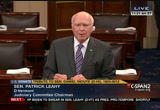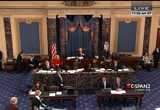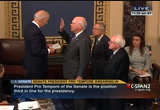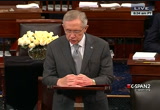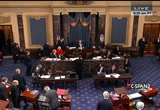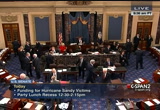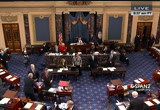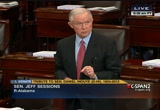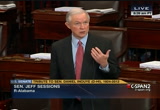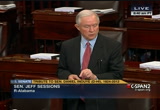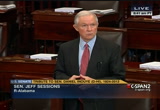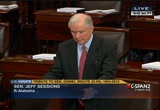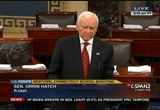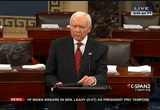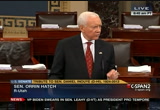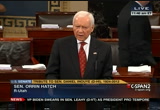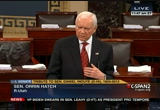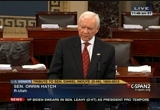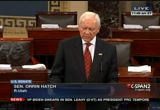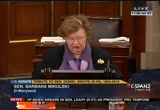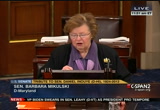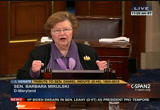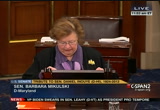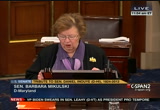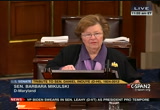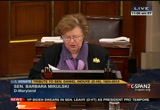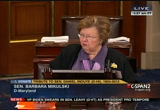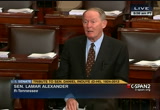tv U.S. Senate CSPAN December 18, 2012 9:00am-12:00pm EST
9:00 am
section of the northeast corridor and see what you got. but we do have some rough analyses accompany when i try to apply them to railroad a has to go and can't stop come and its dependent upon -- that's the faa. i saw the faa bill build up your year after year after year. neither party seems to be able to move it. finally, got to the point where airports around the country, they had to stop all of the work on those airports because congress had failed to pass its bill. public part of the bill. could i ask you whether, you know, the public-private partnership of the kind you're talking about is even suited for the way we fund projects?
9:01 am
we fund projects on an annual basis. that means that the federal, on an annual appropriation basis. so that means that unless there was also negotiated away to keep whatever government funds were a part of this deal coming, wouldn't the private public partnership be in the same position as the faa was? some years where there's nothing, because there's no agreement. this is a democracy, and the way in which it works, particularly when it comes to money is sometimes congress does and sometimes congress doesn't. and i'm trying to apply that to a railroad, which depends through the annual appropriations with congress coming up with its share of the operating fund. and i'm having trouble. >> i completely agree with that point. therefore a much smaller scale projects, for example, a
9:02 am
courthouse was built in long beach, california. it was all of the funds are also subject to appropriation they're coming from the government each year, but given the scale of that being so much smaller, the investors felt comfortable that money will come. i think when you're talking about the magnitude year and the cost associate with significant delays, it raises it to a whole nother level, that's right. >> it seems to me the infrastructure of the government would have to also be changed to account for any such new and important inroads into public-private partnership forever. thank you very much. >> ms. hedlund, you said in your testament that you got the right pieces and the right people in place. do you currently have any private investment in the project? >> is there currently any private investment in the northeast corridor? >> correct. >> yes, there is. and it's in the station. as you are familiar with, the
9:03 am
union developer, redevelopment of union station involves a significant public or private partnership with a private real estate developer. and the same is true with proposed be developed of moynihan station in new york. so yes with respective stations, there is great opportunity to leverage private investment for the department of those stations to pay for the transportation function of those stations. >> and how about as far as phase one? the rail over the environmental process. >> what we will be doing in phase one is to evaluate what potential private investment might be. that is definitely part of the scope of work of phase one. so we will be studying that spent and how about phase two, what type of private investment are you looking for in phase to?
9:04 am
>> well, we will find out in phase one what we come you, that's what phase one is to find out is to what the potential is for private investment, for private going forward. >> unlike in california, the northeast corridor service provides, my numbers to show 75% of rail air market. what's the proportion of passenger rail transfer, transport in the air rail market for california? >> i don't have those numbers, but i know there's been a study of what the impact of the high-speed rail project would be on the congestion between san francisco and los angeles, how much of that traffic is expected to shift to rail. i don't have those numbers with me but i would be happy to get those from the authority and
9:05 am
make them available to you in the record spent and you also would have -- authority would also have a third your projection? >> i don't know exactly what the nature of the projections are but we will get the information that they have and make it of able to you. >> thank you. you can't have a third your projection for the northeast corridor? >> for the air rail split? >> yes. >> that i do not know. you know, i would defer to mr. boardman on this. the introduction of the service itself in 2000, i think the air rail split with something like 3070, or 4060, and then it flips. it's now 75-25. you know, the overwhelming number of people going between washington, d.c. and new york prefer to take the train. it's not because that is always cheaper.
9:06 am
because the service is not. it's because of the time savings and convenience. >> mr. boardman, for the northeast corridor, 80% of the population lives within 25 miles of the northeast corridor making the rail very, very accessible. how would you compare that with california? >> depends on the part of california. one of the things i can answer is, congressman, is that the air rail service between san diego and l.a. is entirely real because it just doesn't work the way that that has, as close as the arts which have and the way that it operates. but when you get to something like l.a. to san francisco you really only have the coast starlight. so there's a sufficient amount of data that would really tell you what really happened here. so from that regard, the old
9:07 am
drink am anna karenina right now what they called it, i guess it was the coast daylight, was the primary way they moved up until 15 years ago between san francisco and l.a., and it was probably the most profitable of the private railroads that years ago in regard to that. in terms of the northeast corridor, we have a projection of what, what the revenues would be 30 years down the line. and probably very little air service in terms of boston to washington -- excuse me, boston to new york and new york to washington, because you would be a an hour and a half between boston and new york and then another hour and a half or hour and 34 minutes between new york and washington. so you would really wind up with very little air service. and that, if you remember back in 2008, and you may not, but there was a great deal of
9:08 am
discussion by the aviation, or former aviation executives that that's something we really should do in the northeast so that those airports today could really be used for longer distance travel. and that we use those that made the most sense which was rail in those corridors. that would garner us our expectation is pretty close to $5 billion in revenue a year, with about a billion plus or minus coming out of that in terms of profit. >> so you cannot do a direct correlation between california's high-speed rail and northeast corridor? they are two completely -- >> not here. excuse me. i don't know if your question is done. we can't, ma i can't draw that conclusion here because you don't have the right data sets. we may have some folks that have an analysis come and i can look at the and get you an answer back spent perfect. thank you. mr. hanna. >> thank you, chairman.
9:09 am
hi, how are you. nice to have you here. advisory commission, you're in the process of developing several other reports analyzing the pressure that would be taken off, projected pressure off of airlines, off of roads and what that means to the northeast will that report be done and what we we be able to get out of it to tell us about the savings that might be incurred, just by virtue of the pressure taking off of those other two or three modes of transportation? >> it's nice to see you, congressman. >> thank you. >> we are undertaking right now several to initiatives. never won, what you will get in early january is -- number one, what you will get a segment by segment of the quarter what the various infrastructure investment requirements are, and it's important to note that
9:10 am
while it is done in a segment by segment basis, the commission views the corridor as geographically siphoned. we don't look at the borders between states. we really look at the investments that are needed for the corridor over all. so you will get that in january. number two, in coordination with the i-95 corridor coalition, we are doing a highway intercept study. and what we are doing there is looking at ways that come in cooperation and collaboration with the northeast future study, what types of people who currently use automobiles would then transfer to the train, intercity passenger rail, and that is going to be completed sometime in the spring. and you will get various updates on the. and lastly, what our primary initiative that we are undertaking right now is the
9:11 am
cost allocation methodology, which is part of the pre-a legislation that congress enacted, which created the commission to see what types of caution allocation needs to be done between the state, amtrak and the federal government. >> will you be projecting the cost savings of any anticipated improvements in those facilities in the absence of the northeast corridor buildout? >> you know, i think what we've all been doing as a standalone state as part of the quarter is looking at what those cost savings are. for example, in new york we just instituted a major way of doing business on the service between poughkeepsie and schenectady, new york. it was a wonderful collaboration with amtrak and the state as to
9:12 am
how those costs are allocated. and those other things we will continue to be doing. >> so that won't necessarily be broken out in terms of potential federal savings of federal offsets, investment? >> you know, i think the challenge that we're facing is, you know, first and foremost we are talking 150 billion here, and we see significant capital investments that need to be made. so one of the primary questions that needs to be answered is, how are those, what other funding sources to make those capital investments. and what we are evaluating is, there will be public dollars as we've been discussing here this morning, what is the capacity and the ability and the risk associated with private sector investment. and how does that all come to pass.
9:13 am
and then as we do that, and we will look at where, along with amtrak and federal rate will -- federal railway administration for potential savings are on the operating side once you make those capital investments. >> i understand. i'm just thinking of it in total, there could be great many savings that his body might want to see and understand. it's going to be a hard sell. >> you know, it is going to be a hard sell, in my 20 years working with both commuter railroads and transportation, one of the reasons we are at the point we are right now, not to anybody's fault, but there hasn't been the type of investment made that needs to be made. we've all pointed to superstorm sandy, and fortunately the tunnel connecting new jersey and
9:14 am
new york, even though it flooded, it did not breach. and that is huge. a lot of times people talk about the tunnel and the gateway project, new york to new jersey project, it is a corridor project. if the tunnel had collapsed, just think of what would have happened in the northeast. not the northeast corridor, but in the northeast. it would have paralyzed the region and the country. and we need those investments and additional titles in baltimore, in new york, improvements on the bridges in connecticut to make this system to attract the ridership that we need to make that, those cost savings and that calculation work. >> i guess what i'm referring to also is the fact that the $4 billion in revenue that is projected, that's just one number, one benefit, one source. it's certainly far from what we should be talking about obvious.
9:15 am
everybody knows that, but the more you can give us, the more you can parse this, different angles you might take. i'm sure it's all going to be helpful. >> and we will absolutely do that with amtrak and our partners at the u.s. dot. >> thank you. my time is up. >> any further questions from any members of the committee? seeing none, i'd like to thank each of our witnesses for your testimony today. i ask unanimous consent at the record of today's agreement open until such time as our witnesses have provided answers to any questions that have been submitted to them in writing. and unanimous consent the record remain open for 15 days for additional comments and information submitted by members for which it is to be included in the record of today's hearing. without objection, so ordered. i'd like to thank our witnesses again for your testimony today. and appreciate your working with our legislative challenge here today. seeing members have nothing further to add, the hearing is adjourned. ..
9:16 am
9:17 am
9:18 am
hawaii, the greatest leader. he served his country as a soldier, receiving the -- highest honor our nation can be so. when we think of how he began to serve his nation, it was difficult to believe the difficulty in hawaii as japanese americans to be a part of our nation's military, they were denied, they were considered aliens of this country.
9:19 am
but he was one of those that wanted to serve his country and they went to the highest level to receive, to receive the dignity, and eventually they were given the honor to serve our country and as we now know, they became the greatest unit in military history with the most decorations of any unit and also with the highest level of decoration of the medal of
9:20 am
honor. he served as a leader, the third longest serving member of the u.s. senate in our nation's history. he served as a defender of people of this country, championing his charges for civil-rights including the equal rights of women, asian americans, african-americans, native hawaiians. it is an incredible understatement to call him an institution, but this chamber will never be the same without him. i remember in childhood in
9:21 am
hawaii that hawaii is the diversified place where i lived. there were many japanese families that lived around us and many nights that i spend sleeping in the homes of our japanese families, 8 their food, slept on the floor and brought up with japanese families so one war broke out, i couldn't understand what was happening because there were families removed from the community and
9:22 am
of course at that time, japanese american boys were not allowed to be in the military. but they pursued it because they wanted to serve this country as well, and this is why in my time in congress i did focus on trying to help the japanese americans in this country and the asians in this country as well. to help them achieve what they really earned. and i remember seeking the medal of honor for the unit and for those who fought in world war ii, and i provided the pentagon
9:23 am
with 100 names from the unit's. and was really surprised there were finally 21 of them that were selected for the medal of honor and senator inouye was one of them. but that showed that they were willing to give their lives for this country and they did. and since then, he -- use the bill to be educated in hawaii, he went to university of hawaii and graduated going on to
9:24 am
further degrees, came back in a sense, those who could help the communities and became leaders in the communities, and in the case of daniel inouye, they were the ones that turned the tide in hawaii politically and since 1954 and by 1959 we became a state and senator inouye ran for office as the first member of the house and after one midterm moved to the senate because
9:25 am
senator long decided to retire. as a result, senator montzanago was elected to the house and served the house and the senate as well and he was a member of the 100th into -- infantry during world war ii but the japanese americans served the country well comment and daniel inouye is one of those great leaders in the history of this country. through my career in congress i have been proud to be on dan's team, we worked together on everything from appropriations
9:26 am
to native american lights to veterans and defense. all of us in hawaii looked up to him and we are so sad to see him go. daniel inouye leaves behind him a list of accomplishments unlikely to ever be parallels. his long dedication and hard work in the name of his beloved country, the united states of america, influenced every part of his life and set him apart even in the senate. he was a fierce advocate and senior member of several committees and the way he
9:27 am
conducted himself commanded respect from all who he worked with. his legacy is not only loving family that he leaves behind, it can be seen in every mile of every road, every nature preserve, every facility that makes hawaii a safer place. he fulfilled his dream of creating a better hawaii. he gave us access to the resources and facilities of the mainland states that he took for granted. tomorrow will be the first day since the allied became a state
9:28 am
in 1959 that daniel inouye will not be representing us in congress. every child born in hawaii will learn of daniel inouye, a man who changed islands forever. i join all the people of hawaii tonight in praying for his wife, irene, is son, his daughter-in-law and stepdaughter jennifer. and his granddaughter maggie that really tickled his life, whenever i had a chance to chat with him we talked about maggie. and they brought so much delay
9:29 am
in his life and carries his legacy forward. i am going to miss dan. so will all of us here in the senate in this great country also. he represented a true american and forcing hawaii he represented a true hawaiian in hawaii and served hawaii and this country well. dan and i have worked so well together all these years and
9:30 am
when i was in house and the appropriations committee, we worked very well between the house and the senate and many of the renovations that have come about in hawaii was because of dan. he really helped to shape hawaii and this great country. but he brought here on earth a kind of life that people of our country and this world can follow and the great citizens of the world.
9:31 am
9:32 am
9:33 am
southern france and was badly wounded during an engagement for which he was awarded the distinguished service cross. which was later upgraded to the medal of honor. our highest award for military valor. with financial assistance from the g.i. bill, inouye graduated from university of hawaii and the george washington university law school. when hawaii became a state on august 21, 1959, annual in a way at one election to the united states house of representatives as a new states congressman. later elected to the united states senate in 1962, he is currently serving his eighth term in the united states and. >> in our earlier and abuse in this series, other people we have spoken to have talked about the first time they were sworn in as a member of congress. in 1959, he became the first member from hawaii. what was that like when you were first on the floor of the house of representatives?
9:34 am
>> well, i spent some time in washington before this, as you know. i went to law school, but i've never been on the floor of the chamber. and so it was an awesome experience for me to be among a multitude of giants, and to have the speaker of the house swear me in. it was a civil ceremony, but i'll never forget it. >> i can imagine. many members come to washington, they managed to find a mentor, a senior member who seems to take them under their wing and help them. was there anyone that you look to at that time, or anyone who kind of looked after you in the early days? >> there were several. one was neil o'brien, who was the chairman of the subcommittee on territories, the committee that had jurisdiction over
9:35 am
statehood. and congressman of colorado who was the chairman of the full committee, the interior committee, and those do on day one looked over me. and told me what to do and what they get and what to buy. and the third person that's most astounding as far as i'm concerned was the speaker of the house. for example, on my first day i found myself in my office all by myself with just finishing, nothing on the wall, and the telephone rang and it was the speaker. and he said if you're free, come on over. and i didn't know where the speaker's office was, but on august, it was a hot day, i didn't know there was a subway. i ran across the ground. finally, made up the steps, but
9:36 am
i learned after that, i used the tunnel. and i got to see him, and believe it or not, the speaker gave me a tumor of the capital. he was a tour guide -- a tour of the capital. he should be the shoe shine boy, and he said if you paying 25 cents, give him a tip. this is the barbershop, this is the bank. then he took me on the floor and he said, that's where i sit. that's where you will set. someday, you will set their by the chairman's place. and then i addressed mr. speaker, and i will address you gentlemen from hawaii. because i will be -- if i pronounce your name because i can't pronounce it. we got to be good friends. he invited me to the texas table
9:37 am
because we had no hawaii table in the dining room. and a chicago fellow and the pennsylvania fellows, new york dolls were all good to me. spent like your colleague senator daniel akaka and norm mineta, world war ii was an important event in their lives and in your life as well. you served in the most highly decorated unit in the history of united states army, and received the bronze star, distinguished service cross and the medal of honor. can you tell us what you learned from that experience? and how did that experience impact your public career? >> well, there are certain things that haunt me, even to this day. and that is the realization that war can change a person's personality. one might be tempted in saying
9:38 am
i'm a good person. you know, for example, one week before i got into the service, put on my uniform, i was a sunday school teacher, and i sang in a choir. and my mother was a devout methodist, women's christian union. they don't get any more devout than that. the whole family was that way. and then after training and going overseas, i recall killing the first german, and the thing that haunts me, i was jubilant. i was proud. and the fellows around me had me on the back and said, terrific, terrific. now, i just killed a human being, and to think that war can change a person so drastically,
9:39 am
has been with the all the time. so when it comes to going into war, i am very cautious. for example, i voted against giving the president the authorization to have a preemptive strike on iraq because i didn't think it was a war that was fully justified, and it was not a war that we -- [inaudible]. so this has haunted me throughout my life. >> let's talk about how you got involved in politics and in public service. when did you decide to enter public service and had your previous experiences and your education prepared you for that? >> well, i, as a young boy, i shattered my arm, compound fractured and i was deeply
9:40 am
impressed by the orthopedic surgeon who fixed me up. and from then on i decided that michael in life was to become someone like him, an orthopedic surgeon. not just a surgeon but an orthopedic surgeon. and, of course, then i studied when i got into college, the first semester i went into premed. but then i got old enough to volunteer, so when i became a teen i volunteered. and when i was on my final battle when i was wounded and lost my arm, it became apparent that i couldn't become an orthopedic surgeon, although my professors tried to convince me to stay in medicine, in some other field. but i decided something else. and in those days, the military give you a whole series of
9:41 am
examinations, written and otherwise, aptitude tests. that after the whole battery of tests have been completed, the panel concluded that i should be in some sort of activity that involves a lot of people. for example, i should either be a teacher, a social worker, a minister, or politician. spent interesting combination. >> teacher in social worker, they're getting paid 125 bucks a month in hawaii. you can't raise yourself on that. and the ministry, i felt that it's not for me because i spend too much. although my mother thought i would be fabulous. and that left political activity. and i must confess, i knew zilch
9:42 am
about politics. i didn't care for it at that time. but i took a look at it, and when i got into the hospital in michigan, one of the fellows i met there was bob dole, and we became good friends, even to this day. and when i asked him, what are your plans, and he, without hesitating said, i'm going to be a county clerk. after that, i'm going to run for the state house. of course, first opening in congress, that's where i'm going. i figure that's a good idea. so i went to law school. i became assistant prosecutor. when the territorial office became available, i ran for that office. and when stated came along, i got to congress. a little ahead of bob.
9:43 am
>> you were in the territorial legislature then before you became -- >> two terms in the house and part of a term in senate spent and then came here as a member of the house. and who did you come here with at that time? >> the house had one member. >> you mentioned senator dole, and the fact that you had been in the hospital with him in michigan. it's amazing that some of these friendships were formed long before any public service, norma minetta talks about being a friend of, excuse me, the sender from wyoming, al simpson, and meeting him when he was a boy scout, together. and you have a relationship with
9:44 am
bob dole spent and the other one is -- all three of us were in the hospital at the same time. at all three became senators just about the same time. >> that is amazing. senator, you and the territorial legislation when hawaii was about to become state and decide to run for congress. what helps you profit decision and what was that campaign might in an area that had never experienced a campaign like that before? >> well, to be first in anything is, it's a great experience. of course, you're the pioneer and you don't know what the rules are. my first campaign, this may shock you, cost $15,000. and this was the inaugural campaign for statehood.
9:45 am
i had a budget of $10,000. [inaudible] and i got a contribution totaling $5000, and i was astounded that people could contribute to such big sums. but i accepted them, and we ran on a budget of 15,000. my campaign for the senate cost me 60,000 the first time. i won't tell you what my opponent spent, but he spent many, many, many times more than i did. when hawaii became a state, the party leaders suggested that i should run for the senate, which i did. then about two weeks later, to elder statesman, elders of the
9:46 am
party, decided to run. one was a very distinguished judge, member of the legal fraternity. the other had served as governor, lieutenant governor, social services director, education director. and so, i withdrew because that's the way i was brought up, to respect my elders. and they noted that, so the man who was elected for a short-term said i will finish this term and i will retire, and retire in favor of inouye. and he told the people who worked for me, and i ran for the senate in 1962, and here i am. >> and at that time, of course
9:47 am
as you mentioned earlier, the state of hawaii had one congressman. so running for the senate was not a different area for you. everyone knew -- >> it's the same area. >> was a difficult at that time, in the earlier days of statehood to run for the several islands and -- >> it's much more interesting, because today, you can literally stay in honolulu and campaign because he of television and radio, and you have dvds that you can send around the place. i would rather go to these little islands and campaign in the villages and townships. that to me was exciting. and i still do my best, whenever time permits, to go to these places. now, in about three weeks i'm going back to hawaii, and at
9:48 am
that time this trip i'm visiting the island of hawaii, the small island, and also me how. it is a privately owned island, but there are people there who are my constituents and i wanted to see them and report to them what's happening here. >> i realized that i could make more in some school auditorium and honolulu meeting a thousand people, more than meeting 200, you know. but i get my kicks out of that. >> in your senatorial career, you have certainly accomplished a great deal. and been here a long time. but one of, or a couple of the most important congressional investigations in recent history have involved you as well. you've been involved in them. as one of the investigators.
9:49 am
and the watergate committee and the iran-contra hearings. you mentioned you have been a prosecutor before you came to the house. how much has that background and the service on those committees formed the thoughts regarding public service, and the country? >> well, my service as assistant prosecutor didn't mean that much. one thing that impressed me was in this land no one is above the law. in other places, you would be thinking or the emperor or the dictator, you are above the law. you make the law. but in the united states, even the president is subject to the law. and he has to answer for his deeds or misdeeds. and that really impressed me. you read about it in books, but you see it in operation is something else.
9:50 am
the other thing that impressed me about these hearings was the awesome power of the media, and television especially. up until then i was totally unknown, other than hawaii, which is not even 1% of the population. but after watergate i began receiving, not just tens of letters, but hundreds and thousands of letters. and one day, according to the latest poll, the most recognizable person is the president of the united states, and guess who is next to him? he says, it's you. i said how can i be the one? he said well, you look different.
9:51 am
but the media can be awful. >> one of the important issues facing the nation today is balancing the need for national security while protecting civil rights and maintaining the freedoms that our nation cherishes. what's your perspective on the current situation? >> maintaining security and maintaining our freedoms is absolutely essential, that's true, but to do that at the expense of destroying our human rights and civil rights is not acceptable. i would say that if a matter is so severe that we are on the verge of war, then the people should be aware that certain things are going to happen, and are happening. if we are going to tap telephones, i think the people of the united states should be made aware who we are tapping and why we are tapping them. it shouldn't be done in the
9:52 am
cover of darkness. >> you were first elected to represent hawaii in the house, and then you have been innocent now since 1963. and other many legislative accomplishments, a couple where the native hawaiian education act, and the native hawaiian health care act. tell us about those and why they were most important to you. >> well, i suppose it goes back to my mother, because my mother was an orphaned at the age of four. at that moment there's no social services in the territory of hawaii. and so she was literally out in the streets, and along came a young hawaiian couple, took her hand and took her home. that's the way they do it. they adopted her. and she lived with them as a
9:53 am
happy child for a year and she never forgot that. she always reminded me what a gentle people, compassionate people these hawaiians are. but as a result, there have been -- they have been exploited, taking advantage of. and so you must do your best to protect them. when i became a politician, hawaii was on the bottom of the social, economic and political ladder. and i did my best to see that they were provided with the basic necessities of life, education and health. over and above what we were providing. then the slums, they lived in equivalent of reservations, out in the countryside far away from
9:54 am
the center of civilization of hawaii. so we brought medicine and education out there. spent in the recent book, "the broken branch," veteran congressional scholars tom mann and norm ornstein argue that increasing partisanship in congress has undermined both public confidence in the institution as well as its ability to perform its constitutional role. how would you compare your experience in congress with congress today? have you noticed an increase in partisanship? lack of comedy? has that hinder the ability of congress to legislate? what they see as the solution, assuming there is a problem, what do you see as the solution to the problem? >> at times i'd like to describe as two different worlds. the world that i was introduced to in 1959 was not a partisan
9:55 am
world. it was a world in which debates were loud and clear, but after the debates were over the men would get together, for smoke or a drink, or have dinner together or visit each other, discuss problems. and you found democrats with their best friends being republicans, and vice versa, which is very common. something you don't see today. and i've tried my very best to be as nonpartisan as i can be, and today it's no secret, one of my best buddies is from alaska, a republican, stevens. and i like him. we don't agree. in fact, according to the poll,
9:56 am
the record-keeping, i think we disagree about 70% of the time. but as we agree upon, if we disagree, let's not be disagreeable. that makes a big difference. when we disagree, we disagree and we explain as simply as possible why we do so. , but when we agree we worked together and in glove. as a result, he and i are on the congress committee, on the defense committee, and to see the difference. we are very productive. in fact the defense appropriations bill, the last six years passed unanimously. that's something. >> that's right.
9:57 am
i have a theory about that as well. it's almost as if people get elected today thinking they're supposed to dislike the person on the other side of the aisle and they don't even know them. and i agree. the idea of yelling and screaming and fighting for principle and then going to dinner was a time honored tradition, which has really disappeared. that i have to agree with spent you also have to remember, this is the land of immigrants. it's not europe. it's not asia. is not africa. but it's a combination of all. the only so-called natives were the indians. the rest of us are foreigners. and sometime we forget that. >> what do you see as a solution to this problem? is very solution? >> i think those of us who get
9:58 am
older should make an extra effort to demonstrate what nonpartisanship can result in. i tried to do that in my regular work, showing my colleagues, see, you can see all these things happening, and those who serve on our committees get the message. >> with your committees, with your relationship with ted stevens, as politics have changed here over the years, democrats in control, republicans the next, it never seems to make that much of a difference on your committee as far as the ability to produce great results. because you work together. >> the other rule i follow, if an incumbent republican is running, i avoid going to that
9:59 am
state. because if you go in that state and say nasty things about him, he won't forget it, when he gets back. >> our final question is the legacy question. over and above the things you've accomplished over have yet to accomplish, how would you like to be remembered? >> this may sound foolish, but i just want people to know i tried my best your content. >> senator, thank you very, very much. >> senator daniel in the way of hawaii died yesterday. the 88 year-old democrat had been in office since why became a state in 1959. he was the longest-serving sitting u.s. senator and the second longest-serving senator in u.s. history. the senate gavels in in a moment. we expected attributes to senator inouye on the floor
10:00 am
today. >> the senate is about to gavels in beginning with the general speeches until 11, and more work on a $60.4 billion relief package for states affected by hurricane sandy. and victims, funding for victims of hurricane. it will provide additional borrowing authority from the national flood insurance program. also today we expect for we expect vermont senator patrick leahy to be sworn in as the new presidential pro tem, third in line to the president. he is taking over the role of hawaii democrat senator inouye who, as was said, passed away yesterday at the age of 88. vice president biden will come to the floor at 11:30 a.m. to swear in senator leahy. and now to live coverage of the senate here on c-span2. the presiding officer: the senate will come to order. the chaplain dr. barry black will lead the senate in prayer.
10:01 am
the chaplain: let us pray. o god, whose days are without end and whose mercies cannot be numbered, keep us aware of life's brevity and uncertainty. as we bid aloha to the second-longest serving senator in u.s. history, daniel ken inouye, we praise you for the beauty of his well-lived life. thank you for the years we shared with him, the good we saw in him and the friendship we received from him. we're grateful for the dignity of his quiet strength that
10:02 am
blazed a trail of significant service sufficient for two lifetimes. may the memories of his bipartisan spirit challenge us to work more harmoniously with each other. bless irene, kenny and the rest of his loved ones. surround them with your love. now give us strength to leave our beloved president pro tempore in your care, for he is a sheep of your own fold, a lamb of your own flock and a servant of your own redeeming. give him the blessed rest of everlasting peace.
10:03 am
we pray in the redeemer's name. amen. the presiding officer: please join me in reciting the pledge of allegiance to the flag. i pledge allegiance to the flag of the united states of america, and to the republic for which it stands, one nation under god, indivisible, with liberty and justice for all. the presiding officer: the majority leader. mr. reid: mr. president, it's tradition here in this body to have flowers on the desk of the departed. we have flying in from hawaii now a lei that would be more hawaiian than these roses. i would ask unanimous consent that we now have a moment of
10:04 am
silence in honor of our departed friend, dan inouye. the presiding officer: the senate will observe a moment of silence. mr. reid: thank you, mr. president. following leader remarks, the senate will be in a period of morning business, the majority will control the first 30 minutes, the republicans the second 30 minutes. mr. president, we're in a unique time in history here. the presiding officer, senator coons, from delaware, is the
10:05 am
president pro tempore until 11:30 today as a result of his being given this charge yesterday morning, this spills over until today. senator biden is going to come here today to swear in senator leahy as the president pro tempore of the senate. all things in life are interesting. senator biden, as some know, lost his wife when he was a brand-new senator. a terrible automobile accident. she was killed. his two boys hurt really badly then, a child lost. and he has taken this day for 30-plus years off to think about the tragedy in his life, but he indicated yesterday he would be able to be here at 11:30 today. so everybody is sacrificing now, and we appreciate. i know the presiding officer had lots of things to do this morning. we appreciate your being part of
10:06 am
the program. we appreciate it very, very much. the senate will recess from 12:30 until 2:15 today to allow for the weekly caucus meetings. i ask consent that we be in a period of morning business until 12:30 today, allow for tributes to senator inouye and the victims of sandy hook elementary school tragedy. the presiding officer: without objection. mr. reid: mr. president, following that recess, we will resume consideration of h.r. 1, the legislative vehicle for the supplemental appropriations bill. i am going to yield to my friend, the republican leader now, for a few minutes. the presiding officer: the republican leader. mr. mcconnell: i thank my friend, the majority leader. today is indeed a day to celebrate the life and extraordinary service to our country of our friend, senator dan inouye. i will have more to say about that later, but what a remarkable individual he was. it had been our privilege to have the opportunity to get to
10:07 am
know him and observe his great work for a very long time. i thank my friend, the majority leader. mr. reid: mr. president, i came to the floor yesterday minutes after irene, senator inouye's wife, confirmed the death of her husband, my friend, a friend of all of us here. i was really, frankly, very emotional and announced to the senate and the country the death of one of the senate's all-time greats. so today upon contemplation, reflection, i might say a little bit more about senator inouye. his personal friendship i value so very, very much. he was a colleague but really a friend. he helped me so many times, helped me do my best here, my best has been with the help of
10:08 am
him. as i mentioned briefly yesterday, he always had so much confidence in me. years ago, years ago when i was a senator struggling, like all senators here, he told me two decades ago that i would be running the senate someday. i never even contemplated, thought about that, desired that. things have worked out that he was right. senator inouye is one of the finest men i have ever known. a real american hero. my friend who is on the floor, the assistant leader, has heard me talk about my mentor, michael callahan. taught me in high school, helped me with money as i was going to law school. and he was on a pension. he was a disabled veteran. he was just such a good friend of mine. he and senator inouye were friends. they talked about what it's like
10:09 am
to not have a limb. callahan's was a leg. inouye's was an arm. and they talked and they were friends. michael callahan worked back here as an aide to senators in summers and got to know senator inouye. my thoughts are with his family, including his wife irene, his son ken, their daughter mancheska, a stepdaughter jennifer and a granddaughter maggie, named after, of course, his first wife. their loss is the nation's loss. last night, we lost a noble soul. dan inouye lived a long and productive life. still i speak for dan's senate family when i say we're devastated by his passing.
10:10 am
but we will all miss him. his legacy will live in the halls of the senate and the state of hawaii as long as history is written. his place in the history books will not fade. as the second-longest serving senator in our history, senator inouye's career in congress spanned the life of hawaii's statehood, elected to the senate in 1962. only robert byrd served longer. senator inouye's tradition of service began long before he came to the united states senate. he was working as a medical volunteer when japanese warplanes attacked pearl harbor. he was just a boy, a teenager. from the time he was just a kid, he wanted to be a doctor, a medical doctor, but a different fate awaited dan inouye.
10:11 am
after the attack, as we all know too well, japanese americans were deemed enemy aliens and were therefore not subject to the draft. in spite of that, in spite of the humiliation, more than 110,000 people of japanese ancestry were imprisoned in american internment camps. i have seen the pictures, we have heard the stories. they were in prison. yet dan inouye and other japanese americans, in spite of the unfair designation of being an enemy alien, volunteered to fight for this nation's freedom overseas, although many of their own families were denied freedom at home while they were overseas. senator inouye fought famously with the famous 442nd
10:12 am
regimental combat team in world war ii and was grievously wounded in battle in italy. now, mr. president, the citation, the words for his medal of honor are as follows -- every medal of honor recipient, they write a paragraph or two about why he was given this award -- "on april 21, 1945, inouye was grievously wounded while leading an assault on a heavily defended ridge near san turazo in tuscany, italy. the ridge served as a strong point along the strip of german fortifications known as a gothic line which represent the last and most dogged line of german defense in all of italy. as he led his platoon in a flanking maneuver, three german machine guns opened fire from covered positions just 40 yards away, pinning his men to the
10:13 am
ground. inouye stood up to the attack and was shot in the stomach. ignoring his wound, he proceeded to attack and destroy the first machine gun nest with hand grenades and fire from his thompson sub machine gun. after being informed of the severity of his wound by his platoon sergeant, he refused treatment and rallied his men for an attack on the second machine gun position which he also successfully destroyed before collapsing from blood loss. as his squad distracted the third machine gunner, inouye called toward the final bunker, eventually drawing within ten yards. as he raised himself up and cocked his right arm to throw his last grenade into the fighting position, a german inside fired a rifle grenade that struck him in the right elbow, severing most of his arm and leaving his own primed hand grenade reflexively clenched in a fist that suddenly didn't belong to him anymore. inouye's horrified soldiers moved to his aid but he shot them back from out of fear his
10:14 am
severed fist would involuntary relax and drop the grenade. as a german inside the bunker reloaded his rifle, inouye pried the live grenade from his useless right hand and transferred it to his left hand. as a german aimed his rifle to finish him off, inouye tossed his grenade into the bunker and destroyed it. he stumbled to his feet and continued forward, silencing the last german resistance with a one-handed burst from his thompson before being wounded in the leg, tumbling unconscious to the bottom of the ridge. he awoke to see his concerned men of his platoon hovering over him. his only comment before being carried away was to gruffly order them to return to their positions since, as he pointed out, nobody called off the war." that is the citation on his medal of honor. his arm was later amputateed in a field hospital and he was sent back to the united states to recover, but it took years for him to recover.
10:15 am
i can remember in the l.b.j. room over here his talking after patty murray and others talked about what a difficult time the returning veterans were having from iraq. about some of his experiences. he took -- they trained him to drive vehicles. he took driver's license tests in more than one state. he became very personal and talked about some of the things they taught him, missing an arm, he had to do. it was a remarkable presentation that he made. senator inouye didn't talk very much. he was a silent man. didn't talk very much at all. he had a dynamic voice. we vice president felt that voice the last few years because he hasn't been as powerful as he was, as he's aged, but what a
10:16 am
beautiful voice he had. and that -- in that hospital they took him to in michigan, senator inouye made his two lifelong friends, one senator bob dole, who as we know, became majority leader here in the senate and the republican nominee for president of the united states. and his other lifetime friend is the late senator phil hart, who was known as the conscience of the senate and the hart building, the massive senate office building, is named after him. asked by his son why after being classified as an enemy alien he and the members of the 442nd fought so heroically, senator inouye said in his usual, calm man, for the children. and for the children there could be no finer role model than senator dan inouye. he was a recipient of the medal of honor, a congressional gold medal, the highest honor can bestow. he served the distinguished
10:17 am
service cross, a bronze star for valor and, of course, a purple heart. dan inouye showed the same dedication in congress he displayed on if battlefield. i want to take just a little bit here, mr. president, and talk about a meeting that i had, i mentioned it very previously last night but it was ten days ago. i knew senator inouye wasn't feeling well so i went down to his office, and he's got a remarkable office. it's a beautiful office. but there isn't one single thing on the walls depicting what a great man he is. there are no awards, there are no commemorative statues. all he has in his office are pictures of washington and hawaii. that's the humility that he showed his entire life. there was no staff there, just the two of us. we talked for an hour. and i would always remember it but his having passed away
10:18 am
yesterday, it will be embedded in my mind. as we left, we both lamented the fact we hadn't been able to sit down and talk like that enough. he professed at that time, these were his words, how lucky he'd bin his whole life. he said i got a little emphysema now, i said it's not from smoking, i've never seen you smoke, he said no, i learned to smoke in the war as a boy, a teenager. he smoked from 1944 to 1967. and they told him he had lung cancer. but they were wrong. but in the process they took out part of his lung out, half of his lung. he talked about how lucky he had been with surviving what he thought was lung cancer, but also how lucky he had been his whole life. for example, the war.
10:19 am
now, i'm sure that most people would reflect on his massive injuries that he had as being lucky, but he considered it lucky that he lived. but there were other examples he gave me. he had been called upon with three other people, three other soldiers, to cross a river in the dark of night to find out what was going on on the other side of the river. and he and his three companions in the dark of the night, they didn't have all this fancy gear to see in the dark, they did their best, they crossed that cold, cold river. and took many hours. they came back and did their report, and he laid down on his bunk and he had had an ingrown toenail, it hurt the whole -- every step he took. so he's laying on his bed and he said here's why i was so lucky. a medic came by and looked at me and look at my foot and he said you have gangrene poisoning.
10:20 am
we've got to get you out of here. so they took him out and he said how lucky i was, i wasn't in battle on that day when half of his companions were killed. he also talked about preparing for another battle, and he's getting ready to do this, he is a private, he may have been a corporal, i don't really remember and a sergeant came and said -- a sergeant came and said inouye, report to the colonel. so he doesn't know what's wrong, he goes and reports to the colonel. the colonel says very curtly, you have to meet with the general today. the only reason he would know to meet with the general is court-martial. that's what everybody thought. so he goes to see at headquarters. sees the general. the general tells senator inouye, i'm promoting you to be
10:21 am
a lieutenant. it was a battlefield promotion. but he said i was lucky. i lucky i became after officer but lucky i wasn't in the fight that day because we also had huge losses. when he scheduled to come back to america, another one of his lucky experiences, they have a transport plane to take him back to america. his arm is gone by then. and he's told we don't have room for another litter, another patient on the airplane. you can't go. so, of course, is disappointed. the plane crashed and killed everybody on the plane. so dan inouye was a person who considered himself lucky. those of us who knew senator inouye consider ourselves lucky just being able to know the man. after hawaii received its statehood in 1959, dan inouye served as the state's first
10:22 am
congressman. three years later, he was elected to the senate and he's been a soft but powerful voice for the people of hawaii ever since. the many personal courtesies he's extended me i will never forget. may not seem like much but i had something where i was scheduled to be in florida, and i had promoted this, the great -- i was a new senator, the great senator inouye was going to be there. and i got a call from henne juni, used to be the sergeant at arms, for a long time senator inouye's chief of staff. he said i've checked his schedule, it's his wife's birthday and he's not going to be able to go. he said i understand that. within an hour i got a call from senator inouye. he said millie understands that totally. he said we'll celebrate the birthday the day after tomorrow when i come back. so he just was somebody who was just so sacrificial to other
10:23 am
senators. as senator inouye's colleague from hawaii, senator akaka said last night, -- quote -- "his legacy can be seen in every mile of every road in hawaii and every nature preserve and every facility that makes hawaii a better place. he fulfilled his dream of creating a better hawaii." he was a strong supporter of the university of hawaii, a strong supporter of george washington university law school, he got his bamp lower's in hawaii, his law degree at george washington. he was determined -- a determined representative of the fighting men and women, a longtime leader of the defense appropriations subcommittee. as i mentioned briefly last night, there has been in my many years in congress, i have been here as long as my friend,
10:24 am
the assistant leader here, who is seated next to me today, we've been here 30 years. and there's been no one i've ever known in my 30 years here who did more and fought more for the fighting men and women of this country. he believed the nation's commitment to the members of its armed forces didn't earned with their -- end with their service. mr. president, for fear it would be lost and it shouldn't be lost, i want to spread on the record what this good man did at a prayer breakfast a couple of months ago. i can't remember if the presiding officer was at the prayer breakfast but i know that my friend, the assistant leader, was there. senator inouye had never, ever in his 50 years in congress cong spoken at a a prayer breakfast but he decided to come. he had great vigor until just recently. he campaigned in this last cycle. he traveled to alaska to help
10:25 am
senator begich a few months ago. he campaigned in nevada and arizona and all over the country. he had great vigor. but he came to the prayer breakfast and talked to us about his experiences. when he was a boy, he never, ever had a gun. that wasn't anything people did in hawaii. and so he was surprised when he got in the army he was such a great shot. he was the best. the best. and as a result of that, he became a sniper in the european theater. and with great humility, he explained he can remember killing his first person, and he can remember they were trying to take a farmhouse and they shot a bazooka into it and he rushed in and there was a man there.
10:26 am
and the man reached in his pocket, of course, senator inouye thought it was for a weapon and he was killed. and inouye saw that he reached for a picture of his family. he said he came to the realization at that time that he wasn't killing enemy soldiers, he was killing other human beings. and although he had to continue doing what he did, he ended his presentation by saying i know exactly how many people that i killed. he said a lot of people go to bed at night counting sheep. even though i'm an old man, i go to bed at night many times counting people. he was somebody who as a result of his experiences voted against war from then on. he didn't support the vietnam war. iraq war one and two, afghanistan, even though he made sure that these people had
10:27 am
all the supplies they needed, our military force. they are the greatest fighting force in the world, and a lot of it is directly he attributable to senator inouye. talking about bipartisanship, he lived that. he was a fine democrat. he was a progressive testimony and was proud of that. but he never hesitated to cross over and work with other senators. and the best example of that was senator stevens, who was killed in an airplane crash fairly recently in alaska. hawaii and alaska, these two fine men representing the two newest states of the union became like brothers and that is the truth. so, mr. president, it's really a shame that dan isn't with us anymore. he was never afraid to speak out against discrimination and was an important advocate for native hawaiians and native pacific islanders. he was the chair of the indian
10:28 am
affairs committee. prior to that time, with all due respect to other chairs, it wasn't a committee people knew much about. senator inouye made that a powerful committee. he traveled the country, receiving all the accolades from these tribes who had never been recognized, who had never had someone that became their advocate and he was. he put the indian affairs committee on the map. served as chairman. commerce committee, the appropriations committee, president pro tem of the senate, the first chair of the committee on intelligence. he served as a member of the watergate committee and chairman of the special committee investigating the iran-contra affair. i repeat, mr. president, this man has been one of the greatest senators in the history of this great country. he had a deserved reputation as a bipartisan bridge builder. he always put his country first and his party send. in 1968 senator inouye gave a
10:29 am
memorable key note speech at the democratic convention. he spoke eloquently of the country's struggles with racism. he also spoke from the heart. this is what he said and i quote, "i wish to share with you a most sacred word of hawaii, it's aloha. to some of you who have visited us, it may have meant hello. to others aloha may have bent goodbye. but to those of us privileged to live in hawaii, aloha means i love you. so to all of you, my fellow americans, aloha. that's what he said those many years ago. so today it's with a heavy heart that those of us who love senator inouye say aloha to a great man, a legend of the senate and his final dying word, mr. president, was "aloha." it didn't mean goodbye. it meant "i love you." and senator inouye, i love you.
10:30 am
the presiding officer: under the previous order, the leadership time is reserved. under the previous order, the senate will be in a period of morning business for one hour with senators permitted to speak therein up to ten minutes each with the time equally divided and controlled between the two leaders or their designees with the majority controlling the first half. the time for morning business has been extended until 12:30. mr. durbin: mr. president? the presiding officer: the senator from illinois. mr. durbin: i see my two colleagues from connecticut on the floor here, and i know they are coming to speak about the horrible tramgd in newtown last friday. i will abbreviate my remarks so they can have the floor and commend both of them for extraordinary statements last night at a memorial service. i will not forget ever some of the things they shared with us about this terrible tragedy. but i come to the floor this morning just for a few moments to pay tribute to one of my great friends and one of my great colleagues, danny inouye,
10:31 am
who passed away yesterday. the majority leader has done such an extraordinary job recounting his life, and i think back what it must have meant to him as he witnessed pearl harbor at the age of 20. he said that he realized at the time that the pilots in those planes that were bombing his family and others in hawaii were people of the same ancestry as his father, and it hurt him. it hurt him as well to be branded as suspect because of his japanese origin and to see literally tens of thousands of japanese americans interned in camps because their loyalty was questioned. he took the opportunity to volunteer and serve our nation to prove that he was willing to risk his life for america, to prove his loyalty. he served in one of the most highly decorated units in all of world war ii, the 442nd
10:32 am
regimental combat team which was comprised of japanese americans, and they fought in the european theater. they recently came to washington to be honored, and senator inouye was there. it was a great moment to see these men of the greatest generation who had proven to america their love for this country, none more so than danny inouye. senator reid has recounted in detail this incredible story of his bravery that earned him the congressional medal of honor, but he was such a humble man. when you look back on his life, there were so many aspects of it that were just historic in nature. you would never know it in conversations with him or working with him. senator reid had the same experience i did. i visited senator inouye's office, and it was unusual by senate standards. i looked out across, there wasn't a picture of danny inouye on the wall. there were no awards for this man who had served more than half a century in congress.
10:33 am
and i said to him, it's interesting, your office has a lot of artwork and photos, but nothing about danny inouye. no, he said i didn't want to put those things up. he said i wanted everyone to feel at ease coming in here. i didn't want to talk about my party affiliation or anything i had done. i wanted them to feel comfortable and to know that this was a welcoming office. that's the kind of person he was. time and again, he proved it. he started off in the territorial house of representatives in hawaii, and when hawaii became a state, he served in congress and later in the united states senate. he was there from the beginning. and what a dynamic leader he was for his state of hawaii. he did so many great things over the years. i was at the same prayer breakfast that senator reid recounted. there was one other story he told which i will only refer to in the most abbreviated form. he talked about his experience as a sniper and how he still had in his mind the images of those
10:34 am
enemy soldiers that he shot down. he couldn't even 50, 60 years later get those images from his mind. he talked about befriending one of his fellow veterans, disabled veterans who was in the michigan veterans hospital. he told me this great story that he shared at that prayer breakfast about how as an officer he would spend his weekends in the great city of chicago at the knickerbocker hotel, he said. that was the hotel for officers. he said i would come into chicago and have a great time on the weekends and head back to the veterans hospital. well, he finally talked one of his fellow hawaiians, a man whose face had literally been burned off to join him on one of these trips to chicago. the man was embarrassed at his appearance and didn't think anyone would want to be around him or talk to him, but danny inouye made sure that when he came to chicago, he prepared all of these different places to stop. every one of them greeted senator inouye and his friend in a warm fashion. the story goes on from there,
10:35 am
and i won't go into the details, but he was a man who always was looking to help someone else. he told how this man who had been so brutally injured in the war returned to hawaii and raised a family and was dan inouye's friend for life, as so many of us were. i think back as well about senator robert c. byrd's funeral in west virginia. mr. president, it was one of the hottest days i can remember. we were up there just baking in the sun at this memorial service for robert c. byrd. i intentionally picked a seat right next to danny inouye. i was mopping the perspiration off. i looked at him in his dark suit without a bead of sweat. i said how do you do this? well, he says, you know, the asian religions are very important in my life, and they believe that mind over matter can achieve great things, and can i visualize myself sitting
10:36 am
in a deep freeze now. i'm not hot at all. i thought this man is amazing in so many different ways what he has done with his life. those stories, some serious, some lighthearted, just reflect so well on this man and what he meant. mr. president, one of the most important things i have on my agenda is the passage of the dream act. i have worked on it for 11 years. there was a time on the floor of the senate, september 21, 2010, when i couldn't break the republican filibuster on the dream act. i was pretty despondent over it. senator reid came to the floor and said a few kind words about my efforts, but then out of nowhere, senator inouye sought recognition. he knew that i was trying to get for millions of these young people living in america a chance to serve their nation and prove their love and become legal in america, become
10:37 am
citizens in america. and he took to the floor and i want to read what he said because it touched me. he said madam president, i wish to step back in history, if i may. on september 7, 1941, something terrible happened in hawaii. pearl harbor was bombed by the japanese. three weeks later, the government of the united states declared that all japanese americans, citizens born in the united states or of japanese ancestry were to be considered enemy aliens. as a result like these undocumented people, they could not put on the uniform of this land. senator inouye went on to say well, i was 17 at the time, and naturally i rescented this because i loved my country. i wanted to put on a uniform to show where my heart stood, but we were denied. so we petitioned the government, and a year later they said okay, if you wish to volunteer, go ahead. senator inouye said well, to make a long story short, the regiment i served in made up of japanese americans had the highest casualties in europe and the most decorated in the history of the united states. and then he turned and said i think the beneficiaries of the
10:38 am
senator from illinois and the dream act will do the same. it was the type of short statement which captured in a few words his life, his sacrifice, what he had proven by risking his life for this country. there is a reason we honor him for this morning. i close by saying two things. first, i think senator akaka came to the floor his night, -- last night, his colleague of so many years. he said on the floor last night tomorrow will be the first day since hawaii became a state in 1959 that dan inouye will not be representing us. he really worked to shape hawaii and this great country. he went on to say you will be missed in washington as much as you will be missed in hawaii. rest in peace, senator inouye. that summarizes how much dan ihas meant to hawaii, how much he has meant to america. his last word, aloha. as senator reid said, so
10:39 am
appropriate. that this kind and gentle american hero would leave with a greeting of love for everyone else. that was his life. i yield the floor. the presiding officer: the senator from california. mrs. boxer: mr. president, i want to associate myself with remarks made by my elegant colleague, senator durbin, and the remarks made by senator reid and all of those who have come to the floor to praise a one of a kind senator and an extraordinary human being, my friend, dan inouye. you know, i was telling senator lieberman when the senate put on a little retirement dinner for our retiring senators, including senator lieberman, there was senator inouye, and we looked back, it was only two weeks ago, mr. president. you know he couldn't have been strong, he wasn't well, but he came to that dinner, he sat at that table because of his respect for the individual senators and for this institution and the love he had for them and for this
10:40 am
institution. as for me, i will miss danny's sown -- sonorous voice, his big heart, his self--effacing manner and his integrity and patriotism. i will say a couple of years, over the years, we have all worked together on so many years. with dan, i worked on bringing a state-of-the-art, first-ever comprehensive casualty care center to my state to take care of the wounded vets that were coming home without their limbs, with the posttraumatic stress and all the problems that they had. there was no such place on the west coast. with dan's help, and he worked with senator stevens on this, we got it done. so that facility stands really as a tribute to dan inouye. and then i want to tell you that in 2010, i had a very difficult campaign, as most of us did at that time, and dan said i'm going to come out there and help you. i was under fierce attack. we had an event for veterans and
10:41 am
dan was the speaker and i was the speaker. as i was speaking, we heard these voices of screaming demonstrators yelling things which were not complimentary toward me, let's put it that way, but it was very loud and i was so humiliated and embarrassed that here was this amazing patriot and would they keep screaming when danny was speaking about my work and his work on veterans? sure enough, the demonstrators kept it up and i was so upset, and i went up to him and i put my arm around him and said dan, when he was finished, i'm so embarrassed, i'm so sorry. he says barbara, he says they're not going to beat you by screaming, don't worry about it. and he went on to go to a couple of events. he took his wife to them, and it was extraordinary.
10:42 am
i love danny with all my heart. every time i looked at him, i smiled because he was so good, he was such a good person. and i pay tribute to him today. and i have to say i don't think we will ever replace him. we'll never replace this remarkable american. he personified the meaning of love and the meaning of country. and so i send my love to his family. in my remaining remarks, i want to talk about what happened in connecticut, and i first want to say to the senators from connecticut i -- i just send you my strength, all my strength. i have gone through things like this, not quite the same, but i tell you as a mom and as a grandma i know your heart is broken, and all of our hearts
10:43 am
are broken, and so many people are touched by gun violence. i want to talk about the fact that in july of 1993, a gunman with an assault weapon walked into a law office in san francisco, killing eight people and wounding another six. just as we see in connecticut, the stories of heroism come forward. one of the people who was killed was a brave young lawyer who threw his body over his wife's body, sacrificing his own life to save hers, and that young man was one of my son's best friends. this was so long ago, but it feels like yesterday because time stops when these things happen. and i know without a shadow of a doubt how these horrific and senseless tragedies live on with the survivors forever, all of us, and with the parents and the spouses and the children and the
10:44 am
families and the friends and the psyche is pierced forever. yes, as human beings, after these tragedies, we come together, we try to find meaning, we try to find justice, we try to find love in the middle of mayhem, and some find solace in their faith and their god and some find solace in their communities, and some never find solace. the slaughter of the innocents must stop. i have to say to my colleagues in connecticut how deeply everyone is -- has been touched by this tragedy. in my community at home, i am -- people are running up to me and they're saying our hearts are breaking. he killed -- he killed babies. they were barely on this earth. they trusted us, and we failed them. and i will tell you that some of the people coming up to me are proud gun owners, they're gun
10:45 am
owners, and they're saying why couldn't we even stop a sick person like this from getting a high-capacity clip? the gunman didn't even have to reload his weapon until he fired off 30 shots. and then the whole issue of -- of protecting our schools, which is something i have cared about. i have the school safety act. i have introduced it so many times. i'm introducing it again. this mentally ill young man, instead of having an appointment with a mental health professional, had an appointment with death. and people say, well, don't talk about doing anything about this now. it's not the time. and i have to say when is the time? if you go back to 2009, that's the last year we have records, 31,347 people died from gun
10:46 am
violence in our nation. that's 87 people every day of the year. another 73,000 plus were injured. 87 people a day killed by gun violence. so when is the time to speak out, mr. president, because every day there's another tragedy? so i will close with this: without going into specifics, there are certain things we need to do. first, we have to take the weapons of war and high-capacity clips off our streets. second, we have to ensure that local law enforcement is involved in conceal and carry permits. third, we have to close the gun show loopholes so background checks are conducted. fourth, we have to keep guns out of the hands of the mentally ill, and get them the help they need. five, we need to keep our schools safe by utilizing all of the law enforcement tools at our disposal. we have failed our children,
10:47 am
and we have to stop worrying about our political skins because, let me say this, judgments will be made about us. so let's pull together. let's show our children we love them. not just by telling them we love them. we must do that. but by showing them that we will protect them. and i send my love to everyone in connecticut trying to pull themselves together. i send my love and support to my colleagues who we will hear from now. thank you. the presiding officer: the senator from connecticut. mr. lieberman: mr. president, i thank the chair. i also want to thank my dear friend and colleague from california for her words of support and comfort and resolve, really. mr. president, we appear to be in one of those periods of time where we're talking too often through the valley of the shadow of death. senator blumenthal and i have
10:48 am
come to the floor to speak about the tragedy that occurred, senseless, horrific attacks on innocent people in newtown, connecticut, last friday, but we must also note with extraordinary respect and sense of loss the death of our truly beloved colleague, senator dan inouye of hawaii. america, as senator reid and senator durbin made so clear, america has lost a true hero, a patriot. this senate has lost a great leader, a leader whose accomplishments have been literally historic, and i think all of us have lost a friend. last evening, senator akaka spoke about how dan inouye's
10:49 am
legacy, i'm paraphrasing here, was all around hawaii and all he had done for the state. the truth is that i think most every state in the country is full of legacies of the service of dan inouye. i know it's true of connecticut. it really was my honor to serve for 24 years with dan inouye here. his -- he was exactly the opposite of all the caricature pictures people have of congress today, and particularly about the rabid partisanship and personal uncivillity. dan was a great gentleman, and the most civil of people, the kindest and most decent of people. and as senator reid said, a proud democrat, a faithful democrat, but not at all
10:50 am
partisan. the relationship that he had with the late ted stevens on the appropriations committee was historic and can actually inspirational. they were so different ostensibly background, temperament, particularly. ted stevens, blessed memory was my neighbor and dear friend. let's say he had a -- well, how do i describe it? he was a very emotional person. danny inouye was more calm. but they formed this remarkable friendship based on shared history going back to world war ii, probably some sense of shared destiny in the sense they were both from the two last states to join the union, not part of the continental united states, came as the first senators and were here so long
10:51 am
but really what united them is an enormous dedication to america, patriotism. and when i said that dan inouye's leag is in connecticut and -- legacy is in connecticut and probably most every other state, i could go around the state and i'm thinking of the years and years danny was the chairman of the appropriations committee and the defense appropriations committee. there wasn't anything that we were able to do for connecticut in that time he didn't support. protecting long island sound, the connecticut river, improving our transportation stems systems, making grants to our schools, colleges, and universities, support of the defense industries in connecticut, which have meant so much to the defense of our country but also to the economy of our state. so i salute his memory. all of us should honor it, and try in our own way to emulate this great man.
10:52 am
mr. president, senator blumenthal and i come to the floor today to thank our colleagues for adopting by unanimous consent last night s.r., senate resolution 621 which is the exactly mirrored to in the words of house resolution 833 condemning the attacks that occurred in newtown, connecticut last friday and expressing sorrow to all those affected by those attacks. we're still in shock in connecticut. all of us who know this little town as america's come to know it, 27,000, 28,000 people, beautiful town, hard-working people who worked their way to get there, tight families, very religious, very much involved in the life of the community, peaceful, and out of nowhere -- and this tragically is the point and the
10:53 am
warning comes this one deranged individual with guns and slaughters 26 innocents, breaking our hearts with 20 of those being young children. i'm sure everybody now feels as if they are part of the family of those who were killed. you look at the faces of those children, pure, innocent, and i think of the words of one of the clergy men at the interfaith service, these are angels and they're with the angels in heaven now. the work, the response of the first responders, and the trauma that they have gone through to face what they had to face and the carnage that they witnessed there and yet you talk to some of them and they're guilty that they didn't get there earlier and couldn't have stopped it somehow. of course, they did more than
10:54 am
we could ask of anybody. they ran to the danger. the principal, the teachers, i mean the stories that come out about the heroism. i remember long ago somebody i heard speak said the definition of courage is grace under pressure. pressure is not really even the word here. it's grace in a moment of terror. the single-mindedness and grace of the principal, the teachers who acted in a way that put their own lives on the line to protect the lives of the children. and let us speak the truth, there were hundreds more children in that building that could have been targets of this madman. so we are wounded, but i will tell you -- and america is wounded, the world is wounded. one of the priests said to me at the other night at the service he was so touched he had received a bundle of letters
10:55 am
from schoolchildren in russia. and it reminded me that there was an incident in russia years ago where a gunman went into a schoolhouse and wantonly killed children and the monsignor was so touched by it, but that's the way this event has touched the world. i will tell you that this is a strong town, and you can feel the people of this community pulling together to support the survivors and thinking about how they can rebuild the town and its spirit. the first selectwoman said so pointedly the other night at the interfaith service that we will not allow this event to define newtown, connecticut, and they will not. but the families of those who have been lost have been changed forever. and it's in that regard that i particularly want to thank my colleagues for this resolution
10:56 am
of condolence and support. i want to thank my colleague, senator reid, for the moment of silence yesterday in this chamber. in my faith tradition, when you visit a house of mourning, one of the customs is for the visitor to sit silently with the mourners. and it's very awkward. it's actually not the natural thing we want to do but this tradition has come about because one, as an act of respect to the mourners because they may be in their own mourning internally. but the other, really -- and we want to allow them to speak first if thept to speak. but -- they want to speak. but the other is in the face of death and particularly the senseless, brutal deaths of these 26 in newtown, sometimes
10:57 am
the best response is silence and all that the silence contains. so i thank my colleague, senator reid, for that moment of silence. senator blumenthal and i and our connecticut congressional delegation convened a vigil last night in which we all spoke and father con roy, the chaplain of the house offered prayer, chaplain black could not be there because he was at senator inouye's bedside with his family. we thank all of you who came last night. your presence metropolitan a lot to us, meant a -- meant a lot to the people back home in newtown. and now the question is, mr. president, can we do anything to stop this from happening again? even once, but hopefully more often. can we -- what can we do? and i understand that as the president said --
10:58 am
incidentally, the president's visit to newtown was so comforting to the families and all of the town or all of the people of connecticut. he brought comfort, and i will say he brought resolve, which was very moving and inspiring to everyone there. and as he said, these situations are always complicated and we can always say as we look at all the possible causes of such a tragedy that, well, even if we did something about that, even if we banned all guns, there would still be violence or even if we provided better mental health treatment, there would still be people who would break through and commit acts of violence and even if we removed all the stimuli to violence in our entertainment culture, still people would commit these acts. of course that's true. but do we not have the capacity
10:59 am
to intervene at the different points in the story of this young man to -- to stop this from happening, at least once again, and probably more -- many more times? of course we have that capacity. i keep taking back, as people say human nature is violence. of course, there is violence. that goes back to the beginning of recorded history. we remember that the two children of adam and eve, cain killed abel in a terribly violent act. but i think we also have to be instructed by what happened after that when god speaks to cain and says where is your brother? and cain feigns ignorance and asks the question that echoes through the millennia since then, am i my brother's keeper?
11:00 am
and god says to cain in genesis, what have you done? you can hear in our mind -- our minds' ears the voice of god god in anger, what have you done? you've killed your brother, you have killed my creation. and then god says your brother's blood cries out to me from the ground. and i think in that the bible instructs us, the words of god instruct us that we are our brother's keepers, we are our sister's keepers, and we are most of all our children's keepers. and that we can never say o, people are just violent and turn away. we have the capacity, particularly we here honored, privileged to serve in the senate, serve in the house, serve in the white house to do something about this. somebody said to me, as the
11:01 am
president said the other night, if we save just one child's life by what we do, it will have been worth it. we can save a lot more than one child if we work together on this. i've talked to people since friday who have said to me why will this be any different? nothing happened after columbine or aurora or virginia tech or any of the other acts of mass violence in our society. i don't blame people for being skeptical. that's the truth. we should have acted earlier. i proposed with senator mccain, senator byrd, senator jack reed, a bunch of others the creation of a national commission on violence three weeks after columbine in 1999, and it passed the senate but it was -- it didn't make it through the house in conference committee. so i understand why people are
11:02 am
skeptical, but that doesn't mean we shouldn't hear the cries of those children as the guns of that madman turned on them and actually see their blood on the ground of that -- the floor of that schoolhouse until we get something done. we can -- we can prevent this from happening to people again. we can certainly prevent it from happening to some people. i see signs of hope around us, people, colleagues who have been protectors of gun rights saying in the last few days this has got to change, we have got to come together and reason together and act together, and everything has to be on the table including our gun laws. there was a poll in "the washington post" today, it was very striking to note that for the first time when people have been asked this question after -- and they have been asked it after a series of acts of mass violence, columbine,
11:03 am
virginia tech, et cetera, aurora, do you think that this was an isolated act or does it say something about more troubling conditions in our society? i'm paraphrasing. for the first time. every other time people said it was an isolated act of a madman or mad people. this time they said it reflects a deeper problem in our society, and i believe what causes that change is that 20 of the victims in newtown, connecticut, were young children, and there is not only a heartbreak across our country about this, not only anger, but i think there is guilt, and we all ought to feel guilty because as a society what the attacks in newtown said to us is that we have failed to
11:04 am
fulfill what would seem to be our most natural, natural law, if you will, responsibility, which is to protect the safety and lives of our children. so i hope we will act. there will be no better tribute, no better source of sons layings to the families that have lost loved ones. i have proposed a commission as i did in 1999 because these are complicated questions. in almost every one of these acts of mass violence, you have a young man troubled, clearing, in hindsight. family, friends, schoolmates say something was wrong with him. very often -- and i have heard rumors about this being the case with adam lanza and newtown. i don't know for sure, so i'm not saying it is any more than a rumor. very often, these young men have had an almost hypnotic
11:05 am
involvement in some form of violence in our entertainment culture, particularly violent video games, and then they obtain guns and they go out and become not just troubled young men but mass murders -- mass murderers. to try to intervene, particularly at the beginning with the troubled young man, and get him or if it's a woman her help quickly to make sure that our mental health system is there to protect and offer that help and perhaps that our insurance system, health insurance is there to guarantee that payment will be made for that is complicated. the impact of the entertainment culture complicated as well. obviously, not every young person who plays a violent video game becomes a killer. i know because i have spent a lot of time looking at the social science on this, and it goes back decades that there is a very clear pattern here where
11:06 am
young people who are involved in violence in the entertainment culture are more aggressive. thank god, of course, almost none of them become murderers, but some of them do and we have got to ask why. and then of course we need to strengthen our gun laws. i hope that either by executive action or legislative action, we will convene such a commission. but, mr. president, i want to make very clear i am not offering this idea as a substitute for any action that we can take now, any action that the president can take now, for instance, with regard to the existing laws that are aimed at preventing people who shouldn't have guns from having them, keeping guns that really are military and are not part of hunting or sports shooting off the market. anything the president can do, anything congress can do.
11:07 am
now, i would support a restoration of the assault ban today. these are weapons developed by our military originally, not by private industry for hunting or sport shooting purposes. they shouldn't be sold. we have got the background checks in the brady bill. if you attempt to buy a gun from a licensed federal firearms dealer, why shouldn't that exist for people who would buy a gun at a gun show, where incidentally terrorists we know have bought guns. so anything we can do quickly we ought to do. but i also think that a commission will make sure that we won't let the anger, the hurt, the guilt that we feel now dissipate with time or as a result of legislative gridlock. yes, legislative gridlock again. remember lincoln's words at gettysburg, that these dead
11:08 am
shall not have died in vain. i think that should be our animating emotion and sense of purpose here as reflected and i think led by the president's very powerful words in newtown on sunday night. i remember after the terrorist attacks of 9/11 all the work that we did here in washington to create the department of homeland security, the 9/11 commission, the legislation to pass the legislation implementing the 9/11 commission, a lot of work, bipartisan work was done here in congress and the executive branch to make those laws and to keep us a lot safer to prevent another 9/11 from happening, but i will tell you this, mr. president, and my belief that i was at the center of all of this, those laws would not have been passed and enacted and we wouldn't be safer today if it
11:09 am
were not for the extraordinary commitment of the families of people who were killed on 9/11 to get involved. they -- they talked truth to power. when members of congress and members of the executive branch were reluctant to act and were falling back in all political ways, self-defensive ways, those families faced them face to face , and they turned -- some in power turned their faces away because they couldn't take it, but ultimately those families brought about action. these families in newtown have lost people, loved ones, children will never be the same. i hope and pray that they can come back to some semblance of normalcy. i hope that some of them will have the courage and the strength which really will take an enormous amount to get
11:10 am
involved in forcing our country to do whatever it can to stop anything like this from happening again, but in a larger sense, we're all members of the family. this is the american family. those 26 people, those 20 children were our children, our family members, and it's incumbent on us now to summon not just the remorse and the guilt but the will to act to stop this from happening again and to save the lives of -- of our family members. i thank the chair, and i yield the floor to my colleague and friend from connecticut. mr. blumenthal: mr. president? the presiding officer: the senator from connecticut. mr. blumenthal: mr. president, i thank my colleague from connecticut for those very
11:11 am
moving and important comments on the floor at this profoundly significant time in the history of our state and our nation. i want to join my colleagues here who have expressed their admiration for senator inouye and our sense of loss at his passing. i admired him deeply as a patriot, a war fighter, a public servant who was unstinting and unwavering in his commitment to our constitution, the principles of equality and justice and our national defense, and his loss is really a loss for the country but particularly personally for all of us who serve in this body i knew him less well than colleagues who have spoken eloquently like senators reid and durbin and boxer and lieberman, and one of my regrets
11:12 am
as i stand here is that i did not have the time to know him better because he was such an extraordinary human being and perhaps one of the lessons for me personally is that time is short, as we all know, and we should make a greater effort in this body and among us in this profession to know our colleagues and to treasure their friendship. i want to thank my colleague from connecticut also for his very perceptive and powerful words on the tragedy in newtown, connecticut, which brings me to the floor today with such a heavy heart. i thank my colleagues who have reached out to me, including the senator from vermont, a great friend, senators klobuchar and durbin and bennet and so many
11:13 am
others seeking to help connecticut and the collegiality of this body has been brought home to me in these days when others have sought to provide not only consolation but also suggestions for action. and one of my reasons for being on the floor today is to talk about action that we can take, and i want the families who are grieving now to know that my standing here to talk about policy and action in no way means any disrespect or effort to intrude on their grieving and emotional rebuilding. but we know on friday a tragedy befell the community of newtown, connecticut, and that tragedy is expressed in senate resolution 621 and house resolution 833. i thank my colleagues in both
11:14 am
houses for condemning the attack and offering their condolences to the people of connecticut and more importantly the people and families who suffered these losses most directly. i have spent the last four days or a better part of them in connecticut. those three days are a time that i don't want to relive ever. i first learned about this incident on friday morning in the midst of a normal day. i had events scheduled. i heard that there was something wrong in the danbury area. as the details mounted, i left hartford to go to newtown and to the firehouse in sandy hook. i arrived there as a public official, but what i saw was through the eyes of a parent. the firehouse in sandy hook was where parents went to find out
11:15 am
if their children were okay. the way they found out was that their children appeared or they didn't, and after a while, some of the children came, some were reunited with their parents there or at the school, and their parents took them home, and others did not. i will live forever with the sights and sounds of those parents as they emerged from the firehouse. the cries and sobbing, the cries of grief and anguish, the look on those faces. the murder -- murderer blasted his sayway no the elementary school in sandy hook armed with a bushmaster a return 15, a
11:16 am
10-millimeter gridlock missile and a 9-millimeter and a multiple magazines filled with ten, 15, 30 rounds, hundreds of rounds that he used in an execution-style massacre. wayne carver, who is the state medical examiner for connecticut, has been in that job for more than 30 years. he has seen it all. but he has said he's seen nothing like this ever. 20 small bodies ripped apart, executed, en masse. so there's no question that evil came to newtown, as governor molloy said that day. evil came in its starkest, most inhumane terms. but her roix -- heroism also came to newtown.
11:17 am
the s.w.a.t. teams that went into that building actually saved lives. they saved hundreds of lives of students and staff in the school because the murderer took his own life when he knew they were entering. there is the heroism, of course, of the principal and teachers and others who ran toward the sound of gunfire. they ran toward danger to protect their children. children who were 6 and 7, their faces now on the front pages of newspapers, their stories inside. the heroism of the state troopers who had to confirm the identities of the victims for their families and stayed with those families throughout the weekend. the heroism of the community itself. newtown is, indeed, a
11:18 am
quintessential new england town. everybody virtually everybody knows everybody else, which is a good thing. but in a way, also, a bad thing. because everyone's children knew the other children. at the vigil sunday night, two of the children who attend that school came up to me to show me some of the necklaces they have made with blue beads, 20 of men and women, 20 blue beads, each one for a child, a victim. and six stars for the adults. this community is not only quintessentially new england, it is squint essentially american in its strength, its resiliency and caring and courage. part of what has inspired newtown is the outpouring of support that they have received from all across america and all across the world. so never doubt that the messages
11:19 am
you have sent, the thoughts and prayers have made a difference to them. they truly is. newtown is a call for national reflection and for coming together. this tragedy hit connecticut, but the town of newtown is supported by the grief shared by all americans. but it's also a call for action. it's the right time to ask what we can do to stop this sort of tragedy. in recent years, there have been horrific shootings at virginia tech, in aurora, in oak ridge, on university campuses, in movie theaters, in places of worship and many other places where unsuspecting americans going about their everyday lives had those lives cut short in a few minutes of slaughter. in newtown, a lone gunman was
11:20 am
able to kill 20 elementary school children ranging from 6 to 7 years old. he killed the school's principal and the school's psychologist and four teachers. sadly, there have always been and there always will be mentally ill people, mentally deranged or hateful people who want to lash out violently at the world and we will never be able to stop all of them from doing harm. but even if we cannot prevent all of these tragedies, we must not surrender and say we will do nothing to prevent any of them. in the last few days, everywhere i've gone in newtown people have come up to me and said the same words over and over, we have to do something. we have to do something. and people in law enforcement, families of victims, members of
11:21 am
the clergy, again and again have said those words, we have to do something. and so that is my commitment the today. to do something, in fact, to do everything i can as a senator to press and prevent the next tragedy. as a former law enforcement official and as a father, i cannot do less. there's no single law, no simple solution that will be a cure-all but there are sound, sensible steps we can take involving, some of them, new laws, some involving better enforcement of existing laws, our local and state police, for example, and federal agencies need more resources and support. we need to do something to effectively ban asawptd -- assault weapons. i'm talking about weapons that are designed for killing and maiming human beings, often as many as possible, as fast as
11:22 am
possible. weapons that are civilian versions of military weapons. there's no reason that any such weapon should be for sale today in america. we need to do something to ban high-capacity magazines, also involved in this mass murder. what real hunter uses or needs 30-round clips? what self-defense situation is served by them? we need to do something to prevent mentally ill people and criminals from having firearms. i don't know whether better laws could have prevented the shooter in newtown from get his hands on the weapons he used, but we must look at what we can do to identify such people with serious mental problems before it's too late and provide intervention and treatment, and take those weapons out of their
11:23 am
hands. to date, the national instant criminal background check system has prevented nearly 1.8 million attempted purchases of firearms by mentally ill people or criminals. clearly, that alone was not enough to prevent a number of tragic shootings. but i think we can all agree that it's good those sales were not completed. and right now, only 60% of gun sales involve a background check. we should ensure that all firearm sales involve a background check, including guns that are not sold by licensed dealers, and that those checks, wherever they're done, are thorough and comprehensive. nothing here means that we should trample on the second amendment. the supreme court has spoken clearly in the heller case that
11:24 am
law-abiding americans have constitutional rights to own firearms, whether for self-protection, hunting, competitive shooting, or any other proper purpose. that is now the law. but the supreme court has also made clear that the government can appropriately impose sensible regulation, just as it can in many other areas of constitutional rights, on how firearms are used and purchased. and everyone would agree that criminals and deranged people should not be able to get their hands on firearms. on all of these issues, we have to look for sensible common ground, rooted in common sense. and believe there is room for people of good will to work together to find it. even as i say that, i am mindful that issue involving the
11:25 am
second amendment rights and violence have in the past fueled deep passions, suspicions and passions have run deep and wide on both sides of this debate, including in this chamber, and there's a lot of distrust to overcome. i am here today to keep faith with the people of newtown who have grabbed my arm and said we have to do something, and that is my commitment. i will work with the president and my colleagues in the senate regardless of party or geography i will work with any organization that's willing to engage in a thoughtful, constructive discussion about what steps to take to avoid tragedies like the newtown shootings in the future. i'll work to find a solution to this crisis because it is a crisis, and i will be deterred by any organization or campaign that uses scare tactics or intimidation because there was nothing more frightening, nothing more horrifying than
11:26 am
looking into the eyes of the parents who came out of that firehouse in sandy hook who lost their babies last friday. that is any parent's worst nightmare. i know there are some who say we can never do anything about the problem of gun violence, that we are entrenched as a nation and so polarized as a political interested we'll continue to wring our hands at every massacre and never take action. and yet sometimes events happen that soar whoify our country and our fellow citizens that they change the nature of the discussion. they change the political ground under us. they are a tectonic shift and i believe the massacre of these innocent children and their loving teachers in newtown is exactly such an event. yesterday some of my senate colleagues had the courage to join this call for action and
11:27 am
say publicly that we cannot go on as before, and i want thank particularly senators manchin and warner. their heroic stance is indeed a challenge to every other member of the senate to join in this common effort to find common ground and at long last do something to stop the killing. i also want to thank particularly senator reid, our majority leader, for his leadership in calling for a meaningful and thoughtful debate on gun violence. we have to do something. we have to do something. we have to do something. that is what people in newtown have beseeched me over and over. i believe the american people agree. this is our moment, and we are the people to do it, and we
11:28 am
can. i ask each of my colleagues to listen to those voices and to hear their own hearts. i thank, mr. president, and i yield the floor to the senator from vermont. mr. leahy: mr. president? the presiding officer: the senator from vermont. mr. leahy: mr. president, first , i want to join my thoughts with those of the two senators from connecticut and the senator who justke, senator blumenthal knows, he and i talked this weekend during these terrible times, and i told him that the judiciary committee, the department of justice, and all, and the victims, were standing by to help him any way they can. mr. president, today is the first day since hawaii became a state that it's not represented by dan inouye, eeft as house
11:29 am
member or as senator -- either as house member or as senator. when i look at my dear friend's desk here with the traditional white flowers and i can't tell you how much it pains me. he was one of the greatest members of this body ever to have served and a dear friend to so many of us. perhaps the best role model for public service any american could act ask for. senator inouye's story is one of great passion for his people, commitment to his calling of public service, and dedication and in finding a better way forward for all americans. a true patriot. a soldier in world war ii, a veteran of the armed services, he fought for the freedom of the nation he so loved and believed
11:30 am
in, and the nation finally recognized that making him a recipient of our congressional medal of honor. as a representative of hawaii he dedicated his career to establishing and solidifying a place for his state in washington so that generations of hawaiians to come might know of the benefits of the things he did not have, federal support for such important causes as higher education, transportation, health care, and security. his advocacy was never in vain. the people of hawaii benefited immensely from his service. i think of his efforts to bring people together is unhatched. the grace with which he conducted his work should inspire all of us, as it does me. he was the man who could reach both sides of the aisle, make friends and make peace. he poured his heart and soul into the senate.
11:31 am
he was first and foremost a person of the senate. and we all felt his passion and concern for the work of this body. there's no doubt he's going to be greatly missed in these halls. he was a mentor, he was a frie friend. we traveled together. our wives are friends, and last night -- and the reason i didn't speak last night, i opened my desk and looked again, a desk i've had now for, in this seat, that i inherited from dan inouye, and his name is inscribed in it. as the distinguished presiding officer knows, we inscribe our names there, and dan inouye's is there. and when i looked at that, i was overcome with emotion.
11:32 am
so i did not speak then p. so i realize i'm delaying by a couple minutes here, but i think of my friend and i think of his name. he said he wanted to be remembered as having represented his people, all americans ho honestly to the best of his ability. he filled that -- he filled that out. we all know he gave his everything to the senate, and his legacy is for us to continue in the work he's done. mr. president, i yield the floor. the presidin
11:33 am
the vice president: the senior senator from vermont and the president pro tempore-elect will present himself to the desk. senator leahy will escort himself to the desks and the vice president will be h escortd to the desk. victhe vice president: do you solemnly swear that you will support and defend the constitution of the united states against all enemies, foreign and domestic, that you bear true faith and allegiance to the same, that you take this oath and obligation freely without any mental reservation or purpose of evasion and that you will well and faithfully discharge the duties of the office on which you are about to enter, so help you god? mr. leahy: i do, so help me god. the vice president: kind of bittersweet moment.
11:34 am
[applause] the vice president: the majority leader. mr. reid: i ask unanimous consent at that the senate proceed to the consideration of s. res. 622. the vice president: the clerk will reportment. the clerk: senate resolution 622 notifying the house of representatives of the election of a president pro tempore. the vice president: is there objection to proceeding to the measure? without objection, the senate will proceed. mr. reid: mr. president, i ask unanimous consent the resolution be agreed to, the motion to reconsider be laid on the table, there be in intervening action or debate. the vice president: without objection. mr. reid: i now ask unanimous consent that the senate proceed to the consideration of s. res. 623. the vice president: the clerk
11:35 am
will report. the clerk: senate resolution 623, notifying the president of the united states of the election of a president pro tempore. the vice president: is there an objection to proceeding to the measure? without objection, the senate will proceed. mr. reid: mr. president, i ask unanimous consent the resolution be agreed to, the motion to reconsider be laid on the table, there be no intervening action or debate. the vice president: without objection. mr. reid: i note the absence of a quorum, mr. president. the vice president: the clerk will call the roll. quorum call:
11:37 am
session ^+segs mr. president? the presiding officer: the senator from alabama. mr. sessions: mr. president, i would ask that the quorum call be dispensed with. the presiding officer: without objection. mr. sessions: mr. president, i would just first say that my friend, the chairman of the judiciary committee, senator
11:38 am
leahy, has -- has been honored to receive one of the senate's highest honors, the president pro tempore of the senate, and i congratulate him on that and join with him in expressing my sadness over the passing of senator dan inouye. he came to this government, started his government service at least, 60 years ago in the territorial legislature of hawaii. he came to congress when hawaii became a state in 1959. to the senate in 1963, second only i guess in service to robert byrd. this is a serious man, a solid man, a patriot, and one who always had a good spirit about how he conducted his affairs and how he related to other members of the senate and to his
11:39 am
constituents and to the american people. he had served in the most violent combat, grievously wounded himself, part of the 442nd regimental combat team, 4,000-man unit, who served in brutal combat. they were a place 3.5 times in personnel to maintain their strength. 14,000 served in that combat team during the brutal combat in italy. 9,500 received purple hearts. 21 medal of honors, including senator inouye's medal of honor. and it was a remarkable time, a remarkable commitment that he
11:40 am
demonstrated to the country that he loved. i would just -- i know we'll talk about his record, and i may do that later myself, but i just want to say what i think about dan inouye at his core. he shared with us a few weeks ago at the prayer breakfast -- we don't quote what people say at that meeting, but he talked about his feeling about war and his participation in it. it was one of the most moving presentations i think any of us had seen, and it was so well-received by the people there. the truth is, senator inouye did not like war. he hated war. he knew the destructive power of war and how people suffered as a result of it. and he voted against a number of resolutions that would have
11:41 am
committed the united states to military action. but, at the same time, there was no doubt, based on his ranking and chairmanship of the subcommittee on defense of appropriations over a period of years, decades, he was the person who always at bottom could be counted on to ensure that this nation was well-defended, that this -- that we did not make mistakes. and he and senator ted stevens had a unique relationship. and when something really developed that was important for the defense department and it involved a danger to our government or could do damage to the department or they needed something rea -- really seriousy needed it -- oftentimes in this government we can't respond or they can't respond effectively -- they would go to dan to dan e
11:42 am
or ted stevens. they felt a sense of great responsibility to ensure that the defense department was not damaged on their watch, and their experience and their judgment is such that they could tell the difference between whines and complaints and real danger to america's defense capability. i would just say, mr. president, that dan inouye has established a record that places him among the finest senators ever to serve here, one of the finest human beings to serve here, and i just want to say, as a member of the armed services committee, how much i appreciated his particular commitment to ensuring that the american defense capability remains second to none, and his willingness to take the steps
11:43 am
necessary to maintain our defense at the level we would want it to be. and so, mr. president, i thank the chair and would yield the floor. hatch mr. president? the presiding officer: the senator from utah. mr. hatch: mr. president, to begin, i want to take a few minutes to express my deepest sorrow for the events of last friday. as a parent, grandparent, and great-grandparent, i was horrified to hear the news of the tragedy in newtown, connecticut. my sadness remains for those who have lost their children and loved ones and for the kauai -- and for the quiet community that saw its community shattered through a senseless act of violence. i, like almost everyone i know, am at a loss at trying to make sense of a tragedy. all i can do is offer my prayers
11:44 am
for those who loved their chairmanchildren, friends, and y members. in my faith we believe that family members are eternal. that belief has helped me to cope with losses i have experienced over the years. while i know that nothing can relieve the pain of losing a child, i hope that this notion will bring the parents of those sweet, innocent children some measure of comfort. once again i offer my heartfelt prayers and deepest sympathy to those in newtown and throughout the country wh who mourn this d. i ask that my further remarks be placed at an appropriate place in the record. the presiding officer: without objection. mr. hatch: mr. president, i also want to take a minute to pay tribute to a main personally loved, appreciated, and worked with for all of these years, all of my 36 years in the senate,
11:45 am
and to bid a fond farewell to our dearly departed friend, the senior senator from hawaii, dan inouye. in addition to being a distinguished united states senator, senator inouye was many things -- a pearl harbor surviervetion a medal of honor recipient, a father, grandfather, a loving husband to his wife irene, and as a volunteer with the red cross, young daniel inouye tended to the wonted in the after-- wounded in the aftermath of the attack of pearl harasser about. when the federal government was placing thousands of his fellow japanese-americans in internment camps, senator inouye was one of many asian-americans who petitioned the government for the right to serve their country in the military. his petition wd and was successful, and he served heroically. in fact, the story of senator inouye's military service has
11:46 am
become the stuff of legend here in the senate and throughout the country. in 2000, senator inouye along with 21 of his fellow japanese-american world war ii veterans were awarded the medal of honor, our nation's highest honor for valor. in 1959 when hawaii chief statehood he was elected the first full member of the house of representatives. three years later in 1962 he was elected to the u.s. senate where he would serve for five decades, the second-longest tenure in this chamber's history. i am honored to have served with senator inouye throughout my entire senate s. while he and i often found ourselves on different sides when it came to issues, i always knew him to be a man of principle and decency, and i never doubted his commitment to the people of his state and to doing what he believed was right. one of the few times we found
11:47 am
ourselves on the same side came when our mutual friend, the late senator ted stevens, asked us both for help when his character was called into question. politically speaking, participating in senator stevens held no benefit for senator inouye. it would have been easy for senator inouye to deny his friend's request, and few would have blamed him for it. but that wasn't how senator inouye operated. rather than letting a friend fend for himself, senator inouye showed great loyalty and characteristic integrity in his willingness to testify to his friend's good character. to put his own reputation on the line in service of a friend. and i had a similar privilege. once again, mr. president, both senator inouye and i were mystified by what happened in that trial. and we were justified in our mistification when finally they had to admit that it was a trial
11:48 am
that should never have been brought. all i can say is i remember him testifying, as i testified after he did. and i also mention colin powell also testified as to ted stevens' character. we both felt, all three of us felt like this is a besmirchment of a truly honorable and decent man. once again, mr. president, i am proud to have been senator inouye's colleague, but i am more proud, more pleased to have been his friend over all these years. he actually showed me a great deal of concern, showed me a great deal of friendship, would spend time with me when i needed particular help, and really was there in many ways for not just me but for others as well. one of the kindest, most decent, honorable people i've met.
11:49 am
i want to express my deepest sympathies to his wife and family and their many, many friends. mr. president, daniel inouye left an indelible mark on the nation he loved so much, and he will surely be missed. aloha, my friend. mr. president, one last thing. i would ask that this be placed at the appropriate place in the record. the presiding officer: without objection. mr. hatch: i want to compliment senator leahy, who now is the president pro tempore of the senate. i have served with pat leahy all of my 35 years. he's a strong, intelligent, hardworking senator, and i'm sure he'll fill this position in every way it can possibly be filled. i know that he, like i, were both sad that we've lost senator inouye. senator leahy will be a worthy
11:50 am
successor and he will have my support, and i just hope everything goes well for him in this new transition, in this new opportunity that he has. mr. president, i yield the floor. ms. mikulski: mr. president? the presiding officer: the senator from maryland. ms. mikulski: mr. president, i too rise to pay tribute to the great senator, daniel inouye. first, i want to express my deep and most heartfelt condolences to senator inouye's family. his wife, irene, daughter jennifer, his son ken, ken's wife jessica, their lovely little granddaughter maggie; and to the people of hawaii, also our condolences because he loved them dearly, and they reciprocated with sending him time and time back to the is that the. and i also want to express condolences to his very able and capable staff, the other inouye family, many of whom were among
11:51 am
the longest-serving staff in the senate that were devoted to helping him help the people of hawaii and help the people of america. hawaii and the nation have lost a great hero and a true patriot, and i've lost a real good friend. senator inouye was one of the great men of the senate who welcomed me and helped me get started when i first came to the senate. mr. president, it's well known that i was the first democratic woman elected in her own right, and when i came to the senate there was only one other woman -- senator nancy kassebaum of kansas. but i said this and i say today, though i was the only democratic woman, though i was all by myself, i was never alone, because i had great men in the united states senate who helped me get started and helped me get -- men toward me and taught -- mentored me and taught me how to be an effective
11:52 am
senator. senator inouye was a group of those men who were the warmest, most generous, in the most helpful way welcomed me to the united states senate. he helped me get on the powerful appropriations committee. he was my teacher. he was my mentor. he also had a wonderful way of communicating with all of us. and as each new class of senators -- each new class of women senators arrived, he welcomed each and every one of us with the same warmth and generosity he showed to me. we have a saying among we, the woman of the senate, which is that men of quality always stand up for we woman fighting for equality. and dan inouye was there every step of the way. when we wanted equal pay for equal work, he was there. when we wanted to have mammograms be included in the n.i.h. and establish an office of women's health he was there.
11:53 am
issue after issue. last year i had the wonderful honor of traveling to the middle east with senator inouye and he admired the pin that i have on today. it is an eagle that many of the women in the senate wear. theretherewe have a little -- wa little collection. this one is from the smithsonian. he said i love it. it's so pretty. i'm going to get one for my wife. well, i don't know if senator inouye ever got it for his wife, irene. but i say to my colleagues today, at an appropriate time, in behalf of the women of the united states senate, i will present this pin to mrs. inouye in honor of her husband. our gift to her because he gave so many gifts to us. he was a lion in the senate, a real american hero. though gentle in style, he was a fierce warrior when it came to fighting for his nation or standing up for hawaii. when he received his medal of
11:54 am
honor, he was rising to the call of the sirens at pearl harbor, volunteering to serve his country, putting aside his own dreams to be a physician. but he went on to be a healer of many wounds. he was decorated in world war ii for saving his fellow soldiers. my experience with senator inouye as a friend was that he was a devoted, dedicated public servant. he was hawaii's first representative of the nation's newest state. he was the first person of japanese heritage ever to be elected to the senate. imagine. he himself knew what it was like to break barriers and to break boundaries. when he came to the senate, he cherished his love for hawaii and its people. he fought tirelessly to improve their lives. now his style was one of absolute civility. he was the one who believed that
11:55 am
the decorum of the senate enabled the senate to do the people's business. it was the essence of civility, and he showed that often good manners was good politics, that led to good politics. he did not argue the loudest, and instead he worked diligently. he marshaled his arguments, and with quiet determination won the day. and as a fellow appropriator, i saw that he really loved his earmarks. he liked earmarks. and what did he do with those earmarks? i can tell you. he made sure that we looked out for indian tribes. he made sure we looked out for the poorest of the poor in hawaii. he cleaned up a super fund site that had been left by an old agricultural legacy and made sure that the children who needed help were able to get the education that they needed in a small community setting that might not have been able to do it. yes, he was the old school.
11:56 am
and it was an old school that should teach us a lesson or two. as a member of the appropriations committee for 41 years, he led us by example. 41 years. he came in 1971, became the chairman in 2009. leading by example, he showed how we can accomplish great things by working together. he saw we can have a stronger country, a stronger economy, and yet have a sense of frugality. he treated the minority party with great respect. all have spoken about his lendary friendship with -- legendary friendship with senator ted steven, another world war ii he roefplt -- hero. as senator akaka was serving as the ranking chairman, he called his the vice chairman. he knew we needed the enactment
11:57 am
of all senators to not only enact our bills but to craft our bills. he served on the commerce committee, indian affairs committee. he was the very first chairman of the select committee on intelligence. there will be those that will read his resume in the history of hawaii this man has written. i hope they say he didn't come here to gain fame. he didn't come here to do press releases or to be on talk shows. he came here to govern. he came here to the united states of america to -- to the united states senate having fought for his country in world war ii while even members of his own family had been held in an internment camp because of their japanese heritage. but he was loyal, faithful to the day he took his oath to defend the constitution as a young private all the way to the day here now. he was a fierce defender of our military. for him, it was always about the
11:58 am
troops. and he never forgot what it was like to be fighting in a foreign land. that's why he was devoted to our veterans and to our health care. we are devoted to the memory of senator inouye. to an old-school war hero, let us give a final salute and fond aloha, but let's take the lessons learned from this great life and incorporate them in our very day here today. mr. president, i yield the floor. the presiding officer: the senator from tennessee. mr. alexander: thank you, mr. president. mr. president, senator inouye told me a story which i would like to repeat for our colleagues. in 1973, george gallop, pollster, asked to come see him. this was at the height of the watergate hearings. back then, these investigations into president nixon's watergate
11:59 am
break-in were consuming the country. then there were only three major television networks plus the public broadcasting system. and the watergate hearings televised from the senate for every single day, several hours a day on all four of those networks. so almost everyone in the country for weeks watched the watergate hearings. they got to know sam ervin the chairman, they got to know howard baker, the ranking republican. when gallop came to see senator inouye and senator inouye said i'm glad to see you but why do you come to see me? he said, senator, who would you say is the most recognized person in the united states today? and senator inouye said, well, i'm sure president nixon is, and gallup said that's right. but the second-most recognized person is senator dan inouye. inouye said, how could that be?
151 Views
IN COLLECTIONS
CSPAN2 Television Archive
Television Archive  Television Archive News Search Service
Television Archive News Search Service 
Uploaded by TV Archive on

 Live Music Archive
Live Music Archive Librivox Free Audio
Librivox Free Audio Metropolitan Museum
Metropolitan Museum Cleveland Museum of Art
Cleveland Museum of Art Internet Arcade
Internet Arcade Console Living Room
Console Living Room Open Library
Open Library American Libraries
American Libraries TV News
TV News Understanding 9/11
Understanding 9/11